 08/12/2012 14:33 08/12/2012 14:33 |
|
| | | OFFLINE | | Post: 25.899
Post: 8.392 | Registrato il: 28/08/2005
Registrato il: 20/01/2009 | Administratore | Utente Master | |
|
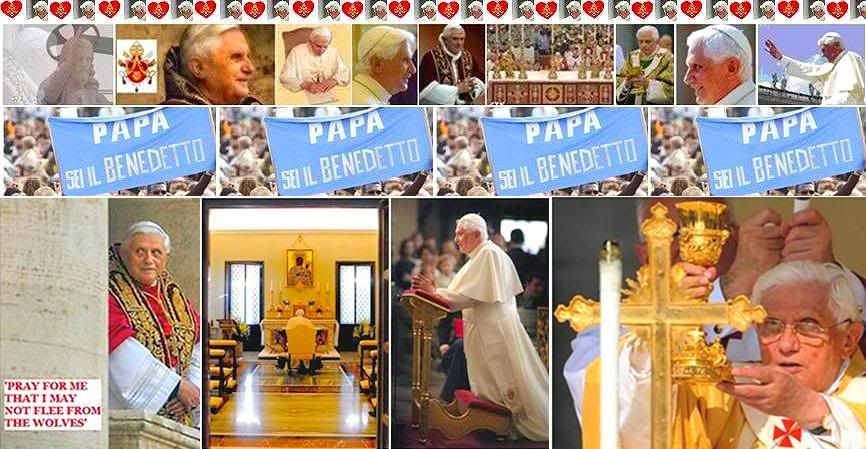


 Benedict XVI to International
Benedict XVI to International
Theological Commission:
'Without faith, there can be
no authentic theology'
Translated from the Italian service of

December 7, 2012
Theology is not a science like others, even if like all the sciences, it follows the scientific method and its rules, says Benedict XVI.
In fact, "faith is the genetic code of Catholic theology" that must not be confused with 'the religious sciences', in that it is both 'confessional and rational inseparably', the Pope said in an important address to the International Theological Commission on Friday morning.
Theologians "can participate in the evangelical initiatives of the Church" only by 'faithfully serving the truth of faith", he said. Central to this is the sensum fidei, the sense of faith possessed by believers.
Such sensum fidei, he underscored cannot be in conflict with the Magisterium (teaching) of the Church, and theologians must pay great attention to the common sense of the faithful, "which consist in the believer of a kind of supernatural instinct that has a vital co-nature with the objectives of the faith".
He said this was "a criterion for discerning whether a stated 'truth' belongs or not to the living deposit of the apostolic tradition". Which requires further criteria that would allow distinguishing between the genuine sensum fidei and its counterfeits.
Here is my translation of the Pope's address to the ITC members:
Venerated Brothers in the Episcopate and Priesthood,
Distinguished Professors
and Dear Collegues:
I welcome you with great joy at the end of your annual plenary session. I cordially greet your new President, Mons. Gerhard Ludwig Müller, whom I thank for the words he addressed to me in your behalf, as well as your new Secretary-General, Fr. Serge-Thomas Bonino.
Your plenary session took place in the context of the Year of Faith, and I am profoundly happy that the International Theological Commission has decided to manifest its adherence to this ecclesial event with a pilgrimage to the Papal Basilica of Santa Maria Maggiore in order to entrust to Mary, praesidium fidei, the work of your Commission, and to pray for all those who, in medio Ecclesiae dedicate themselves to fructify the intelligence of the faith for the benefit and spiritual joy of all believers. Thank you for this extraordinary gesture.
I also express my appreciation for the message that you issued on the occasion of this Year of Faith. It highlights very well the way by which theologians, faithfully serving the truth of the faith, can participate in the evangelizing initiative of the Church.
This message takes up the themes that you developed more amply in the document "Theology today: Perspectives, principles and criteria", published at the start of this year. Taking note of the vitality and variety of theology after the Second Vatican Council, this document intends to present, so to speak, 'the genetic code of Catholic theology', namely the principles that define her very identity, and consequently, guarantee her unity in the diversity of her initiatives.
With that purpose, the document clarifies the criteria for a theology that is authentically Catholic and therefore capable of contributing to the mission of the Church, the announcement of the Gospel to all men.
In a cultural context where some are tempted either to deprive theology of academic standing because of its intrinsic bond to faith, or of doing away with the believing and confessional dimension of theology, thus risking its confusion with and reduction to the religious sciences, your document opportunely recalls that theology is inseparably confessional and rational, and that its presence within a university institution guarantees - or should guarantee - an ample and integral view of human reason itself.
Among the criteria of Catholic theology, the document mentions the attention that theologians must give to the sensum fidelium - the sense of the faithful. It is very useful that your Commission has focused on this topic which is of particular importance for reflecting on faith and for the life of the Church.
The Second Vatican Council, reiterating the specific and irreplaceable role that falls to the Magisterium, underscored nonetheless that all the People of God together take part in the prophetic function of Christ, thus realizing the inspired desire expressed by Moses: "If only all the people of the LORD were prophets! If only the LORD would bestow his spirit on them!" (Nm 11,29).
The dogmatic constitution Lumen gentium teaches us in this respect: "The totality of the faithful, having the unction coming from the holy (cfr 1 Jn 2,20.27), cannot be mistaken in their belief, and manifest its propriety through the supernatural sense of faith in all the people, when from the bishops down to the last faithful, they demonstrate their universal consensus in matters of faith and morals (n. 12).
This gift, the sensus fidei - the sense of faith - constitutes in the believer a kind of supernatural instinct which has a vital co-nature with the purpose of the faith. We observe that it is precisely the simple faithful who carry with them this certainty, this sureness, about the sense of their faith.
The sensus fidei is a criterion to discern whether a truth belongs or not to the living deposit of apostolic tradition. It also presents a propositive value because the Holy Spirit does not cease to speak to the Churches and to guide them towards the entire truth.
Today, nonetheless, it is particularly important to identify the criteria that allow us to distinguish the authentic sensus fidelium from its counterfeits. In fact, it is not a kind of ecclesial public opinion, and it is unthinkable to mention it in order to contest the teachings of the Magisterium, since the sensus fidei cannot develop authentically in the believer if not to the degree that he participates fully in the life of the Church, and this demands responsible adherence to her Magisterium, to the deposit of faith.
Today, this supernatural sense of faith that believers have leads to reacting vigorously against the prejudice according to which religions - particularly the monotheistic religions - are thought to be bearers of violence, especially because of their claim to advocating the existence of a universal truth.
Some maintain that only the 'polytheism of values' would guarantee tolerance and civilian peace, and would conform to the spirit of a pluralistic democratic society.
In this direction, your study on "God Trinity, the unity of men: Christianity and monotheism", is of actual relevance. On the one hand, it is essential to recall that faith in the one God, Creator of heaven and earth, meets the rational demands of metaphysical reflection, which is not weakened but reinforced by the Revelation of the mystery of the God Trinity.
On the other hand, it must be emphasized that the definitive Revelation of the mystery of the one God took shape in the life and death of Jesus Christ, who went towards the Cross like "a lamb led to slaughter" (Is 53,7).
The Lord attests to a radical rejection of every form of hate and violence in favor of the absolute primacy of agape - love of our fellowmen. Therefore, if in history there have been forms of violence carried out in the name of God, they are not to be attributed to monotheism, but to historical causes, principally to the errors of men.
Rather it is forgetting God that immerses human societies in a form of relativism, which inevitably generates violences. When the possibility is denied for everyone to refer to an objective truth, dialog is made impossible, and violence, declared or hidden, becomes the rule of human relationships.
Without being open to the transcendent, which allows finding responses to the questions on the meaning of life and how to live in a moral way, man becomes incapable of acting with justice and to be committed to peace.
Since the rupture of man's relationship with God carries with it a profound disequilibrium in the relations among men themselves, reconciliation with God, which Christ effected on the Cross, 'our peace'/G][ (Eph 2,14), is the fundamental source of unity and brotherhood.
This perspective is also that of your reflection on the third subject, the social doctrine of the Church within the ensemble of the doctrine of the faith. It confirms that social doctrine is not an extrinsic addition, but, without ignoring the contribution of a social philosophy, it draws its fundamental principles from the sources of the faith itself.
This doctrine seeks to make effective, in the great diversity of social situations, the new commandment that the Lord Jesus left us: "As I have loved you, so you also should love one another" (Jn 13,34).
Let us pray to the Immaculate, model of one who listens and meditates on the Word of God, that she may obtain you the grace of always serving joyfully the intelligence of the faith for the good of the whole Church.
Renewing my expression of profound gratitude for your service to the Church, I assure you of my constant closeness in prayer, and from the heart, I impart the Apostolic Blessing on all of you.
[Modificato da TERESA BENEDETTA 10/12/2012 15:16] |
| |
|
| |
 08/12/2012 14:36 08/12/2012 14:36 |
|
| | | OFFLINE | | Post: 25.900
Post: 8.393 | Registrato il: 28/08/2005
Registrato il: 20/01/2009 | Administratore | Utente Master | |
|
 New Popemobile will debut
New Popemobile will debut
at Dec. 8 Spanish Steps event

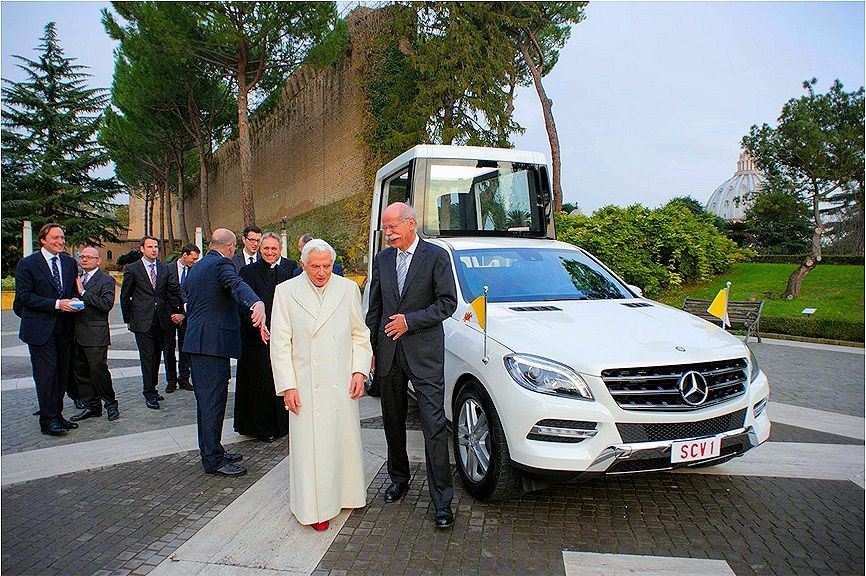 Daimler's CEO Dieter Zetsche handed over the new Popemobile to the Holy Father on Friday.
Daimler's CEO Dieter Zetsche handed over the new Popemobile to the Holy Father on Friday.
BERLIN, December 7 (AP) -- German automaker Daimler says it has delivered Pope Benedict XVI his new popemobile — a customized Mercedes-Benz M-Class SUV with special security features.
The company says the new car was delivered Friday to the Vatican and people should be able to see the Pope riding in it Saturday in Rome during a celebration at the Spanish Steps.
Compared with the previous vehicle, a modified M-Class from 2002, Mercedes has extended the dome significantly to give the Pope more room and easier entry. Larger glass panels and better illumination also aim to make the Pontiff more visible to crowds.
Daimler says the white-painted vehicle's central interior design feature is a "throne" embroidered with the pontiff's coat of arms.
The automaker declined to detail the vehicle's "spectrum" of security features.
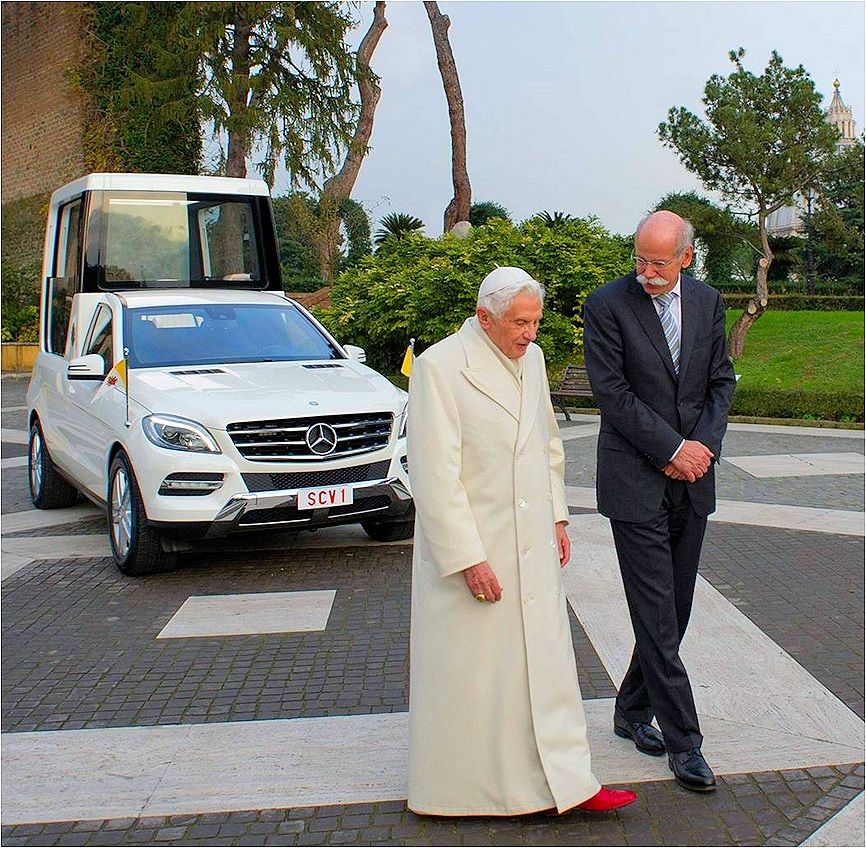
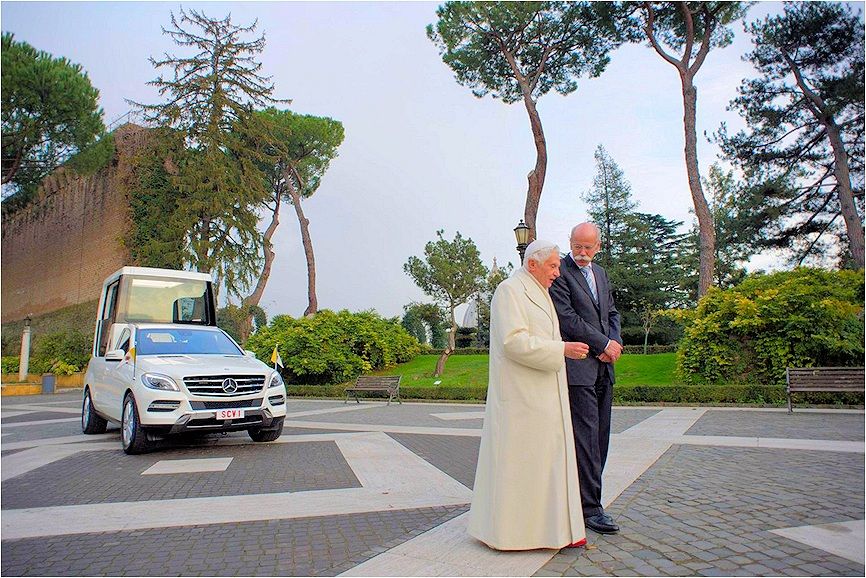
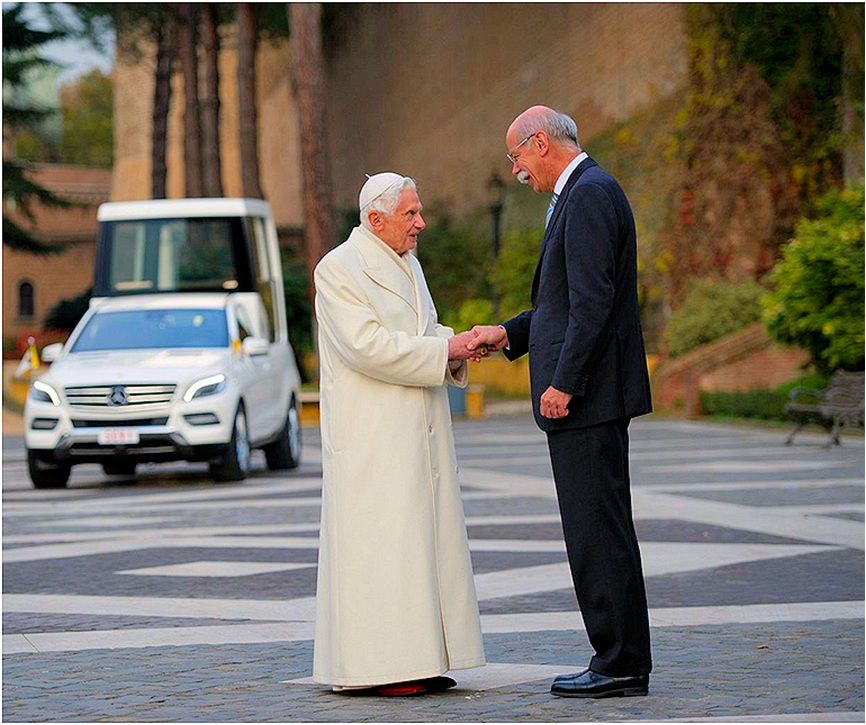 [Modificato da TERESA BENEDETTA 10/12/2012 09:30] |
| |
 09/12/2012 16:30 09/12/2012 16:30 |
|
| | | OFFLINE | | Post: 25.901
Post: 8.394 | Registrato il: 28/08/2005
Registrato il: 20/01/2009 | Administratore | Utente Master | |
|

 Saturday, December 8, First Week of Advent
Saturday, December 8, First Week of Advent
SOLEMNITY OF THE IMMACULATE CONCEPTION
OF THE BLESSED VIRGIN MARY
 Some familiar paintings: From left, by Carlo Crivelli; 2 by El Greco; 2 by Esteban Murillo (who painted 4); 2 by Francisco Zurbaran (who had 3); and by Giambattista Tiepolo.
SOLEMNITY OF THE IMMACULATE CONCEPTION
Some familiar paintings: From left, by Carlo Crivelli; 2 by El Greco; 2 by Esteban Murillo (who painted 4); 2 by Francisco Zurbaran (who had 3); and by Giambattista Tiepolo.
SOLEMNITY OF THE IMMACULATE CONCEPTION
This has been a major Church feast since 1476 when Pope Sixtus IV made it a religious holiday,
but it was not until 1854 when Pope Pius IX formally proclaimed the dogma of the Immaculate Conception, as follows:
We declare, pronounce and define that the doctrine which holds that the Blessed Virgin Mary, at the first instant of her conception, by a singular privilege and grace of the Omnipotent God, in virtue of the merits of Jesus Christ, the Saviour of mankind, was preserved immaculate from all stain of original sin, has been revealed by God, and therefore should firmly and constantly be believed by all the faithful.
—Pope Pius IX, Ineffabilis Deus, December 8, 1854
Readings for today's Mass:
www.usccb.org/bible/readings/120812.cfm
WITH THE POPE, 12/8/12
Holiday Angelus - Benedict XVI paid tribute to Mary as "a genuine expression of grace", saying that
the light that emanates from her figure helps us to understand the true meaning of original sin.
He offered prayers for the thousands of victims, including hundreds dead, of recent floods in the Philippines
Homage to the Immacolata - Keeping to a new tradition introduced in recent Pontificates, the Holy Father
went to Rome's Piazza Spagna for the annual tribute to Our Lady of the Immaculate Conception (l'Immacolata)
at the pillar raised there in her honor. Homily.
December 9, Second Sunday of Advent
 ST. JUAN DIEGO CUAUHTLATOHUAC (Mexico, 1474-1548)
ST. JUAN DIEGO CUAUHTLATOHUAC (Mexico, 1474-1548)
Modern scholars question whether this saint ever existed, pointing to lack of documentation about him at the time of the Marian apparitions and miracle (1531) that made him a decisive figure for the mass Christianization of Mexico immediately following the 1531 apparitions (in 1532-1538, at the height of the Protestant Reformation in Europe). Mainly, they claim that the bishop at the time of the apparitions never mentioned it in his writings. However, there is the fact (scientifically unexplained) of Juan's tilma (cloak) on which the image of the Virgin was imprinted, and that photographic enlargements of the Virgin's eyes from the image on the cloak show a reflection of Juan Diego. The story is that the Virgin appeared to the elderly native Indian peasant, a devout widower, and told him to ask the bishop to build a church on the spot. In order to convince the skeptical bishop, the Virgin told Juan to gather roses from the spot (it was December) and bring them to the bishop. He wrapped the miraculous flowers in his cloak, and when he opened it in front of the bishop, there was the image of the Virgin on the tilma [the object now venerated in the Basilica of our Lady of Guadalupe in Mexico City). Before Juan Diego was canonized in 2002 - the first native American to earn this distinction - the Vatican named a 30-man commission of scholars to research and establish the authenticity of his life and the events related to the apparitions. The Basilica of Guadalupe outside Mexico City is now the world's most visited religious shrine.
Readings for today's Mass:
www.usccb.org/bible/readings/120912.cfm
AT THE VATICAN TODAY
Sunday Angelus - The Holy Father reflected on the figure of John the Baptist, who, next to Mary, 'represents' Advent
literally and figuratively in the Catholic faith, saying the Baptist "reminds us of the need for repentance
and purification as we prepare a way for the Lord and await in hope his coming in glory".
Not previously announced, the Pope addressed the Opening Mass this afternoon of the International Congress
in Rome on the occasion of the 15th anniversary of the Synod of Bishops on the Americas.
I have combined the 'almanac' entries for December 8 and December 9, as I have fallen two days behind in my posting, for which I cannot apologize enough and may have to continue doing - until I can work out a system to manage my time after a distinct change in the nature of my daytime job, which is six days a week, and the time-intensive and time-dependent workload which the change has meant. Principally, I no longer have desk time available during the day to add a post or two as I discover items to post, and after catching up with domestic duties at night, I find I can no longer stay up long enough to make up for 'time lost' for the Forum during the day... So, for the interest of all who follow this Forum, I would truly welcome it if any of you could fill up the slack by posting any items that should be posted, especially if any big news breaks while I am away from the Internet! Otherwise, until I can work out some time management solution, it will be a 'stale news' Forum...
NB: Since Dec. 8 was a religious holiday and today is Sunday, I am behind in posting items on the three papal events in these two days - the Angelus and the Piazza Spana event yesterday, and the Angelus today (all have to be translated), and the Pope's address in English to the bishops of the this afternoon... In addition, I have yet to translate the Pope's address to the International Theological Commission, but I have posted my translation of the Wednesday catechesis - with the omissions from the official text - in the apposite box in the preceding page. I hope I can catch up today.
[Modificato da TERESA BENEDETTA 10/12/2012 15:32] |
| |
 09/12/2012 22:39 09/12/2012 22:39 |
|
| | | OFFLINE | | Post: 25.902
Post: 8.395 | Registrato il: 28/08/2005
Registrato il: 20/01/2009 | Administratore | Utente Master | |
|
 HOLIDAY ANGELUS
HOLIDAY ANGELUS
December 8, 2012
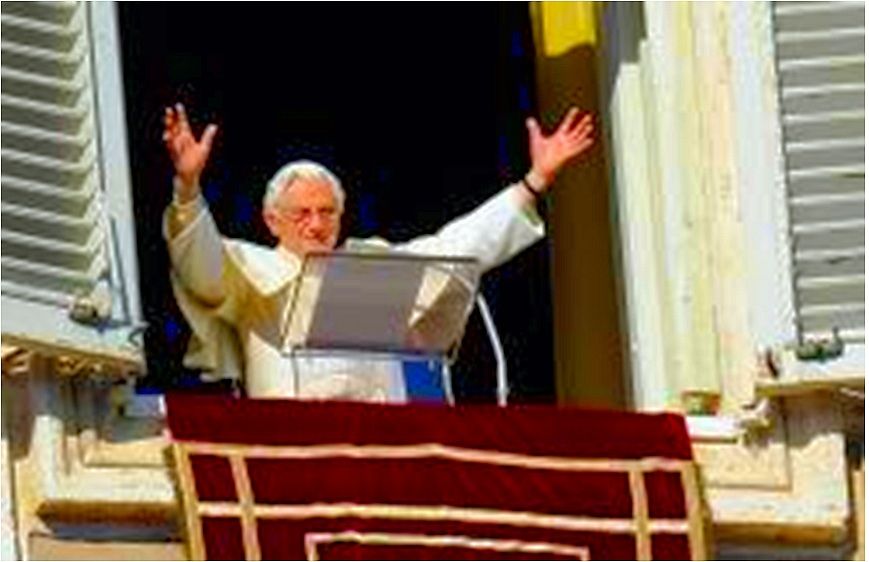
Before leading the holiday Angelus prayers Saturday in St. Peter's Square on the Solemnity of the Immaculate Conception, Pope Benedict called Mary 'a genuine expression of Grace' and said that the light emanating from her figure "helps us to understand the true meaning of original sin".
In English, he said:
Today, with joyful hearts, we celebrate the Immaculate Conception of the Blessed Virgin Mary. Through her powerful intercession, may the Lord grant us the grace to reject sin and persevere in the grace of baptism.
The Pope said that the doctrine of the Immaculate Conception of Mary expresses the certainty of faith that God's promises have been fulfilled - through Mary, who brought into the world God's only Son, Savior of the world.
After the prayers, the Holy Father expressed his closeness to the people of the Philippines who have been hit in recent days by a violent storm.
I wish first of all to assure my closeness to the peoples of the Philippines who have been struck in recent days by violent typhoons. I pray for the victims, for their families, and the many who are now homeless. May their faith and charity be a strength for them in facing this difficult trial.
The Holy Father then reminded the faithful that, in the afternoon, he would be making his traditional visit to pay homage to Mary Immaculate at the pillar erected in homage to her in Rome's Piazza Spagna.

Dear brothers and sisters,
I wish for all of you a happy feast day of Mary Immaculate!
In this Year of Faith, I wish to underscore that Mary is immaculate by a gift of the grace of God who had found in her a perfect willingness and collaboration. In this sense she is 'blessed' because "she believed" (Lk 1,45), because she had firm faith in God.
Mary represents 'what remained of Israel', the holy root that the prophets had announced. The promises of the Old Covenant found their welcome in Herb. In Mary, the Word of God found listening, reception, and response - it found the Yes that allowed him to take flesh and come to dwell among us.
In Mary, mankind and history truly open up to God, welcoming his grace, and ready to do his will. Mary is the genuine expression of Grace. She represents the new Israel, which the Scriptures of the Old Testament describe symbolically as spouse.
St. Paul reprises this language in his Letter to the Ephesians when he speaks of matrimony and says, "...Christ loved the church and handed himself over for her, to sanctify her, cleansing her by the bath of water with the word, that he might present to himself the church in splendor, without spot or wrinkle or any such thing, that she might be holy and without blemish" (5,25-27).
The Fathers of the Church developed this image, and thus, the doctrine of the Immaculate first arose in reference to the Church virgin-mother, and subsequently, to Mary. Efrem the Syrian wrote poetically:"As bodies themselves have sinned and die, and the earth, their mother, is cursed (cfr Gen 3,17-19), thus, too, because of the body that is the incorruptible Church,her earth is blessed from the beginning. This earth is the body of Mary, temple in which a seed was deposited" (Diatessaron 4, 15: SC 121, 102).
The light that emanates from the figure of Mary also helps us to understand the true meaning of original sin. In fact, in Mary, that relationship with God that sin had broken apart was fully alive and working. In her, there was absolutely no opposition between God and her being: there was full communion, full understanding. There was a reciprocal Yes, from God to her, and from her to God. She was full of his Grace, of his Love.
Finally, the doctrine of the Immaculate Conception of Mary expresses the certainty of faith that the promises of God are realized - that his covenant never fails, but had produced a holy root, which germinated the blessed Fruit of all the universe, Jesus, the Savior.
The Immaculate demonstrates that Grace is able to elicit a response, that the faithfulness of God can generate a faith that is true and good.
Dear friends, this afternoon, as usual, I will be going to Piazza di Spagna for the homage to Mary Immaculate. Let us follow the example of the Mother of God, so that in us, too, the grace of the Lord may find a response ion a genuine and fruitful faith.
Yet another apology - Earlier I posted the pictures for the Dec. 9 Angelus here (the ones that show the Pope framed through the Christmas tree on St. Peter's Square). I picked up the two photos (correct ones) for the Dec. 8 Angelus from Vatican Radio online.
[Modificato da TERESA BENEDETTA 10/12/2012 08:45] |
| |
 10/12/2012 02:01 10/12/2012 02:01 |
|
| | | OFFLINE | | Post: 25.903
Post: 8.396 | Registrato il: 28/08/2005
Registrato il: 20/01/2009 | Administratore | Utente Master | |
|

 Homage to the 'Immacolata':
Homage to the 'Immacolata':
The Pope at Piazza Spagna
December 8, 2012
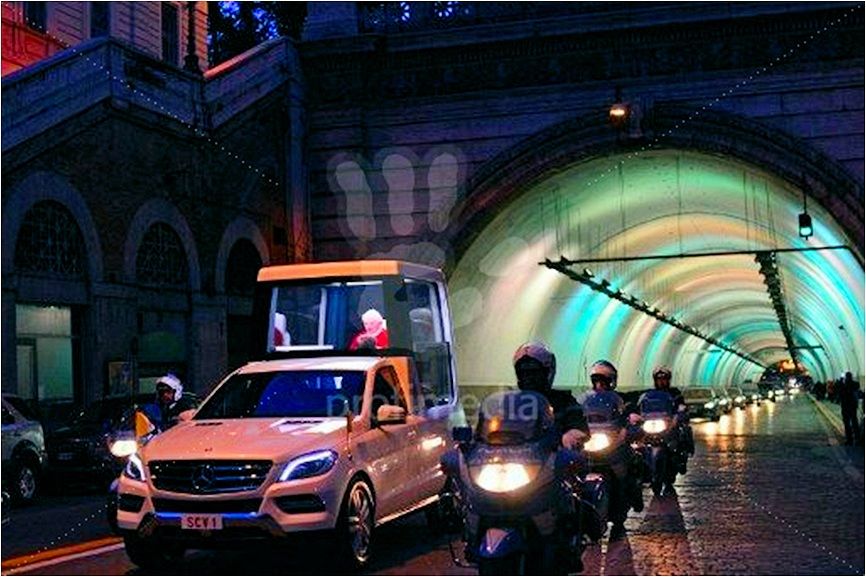
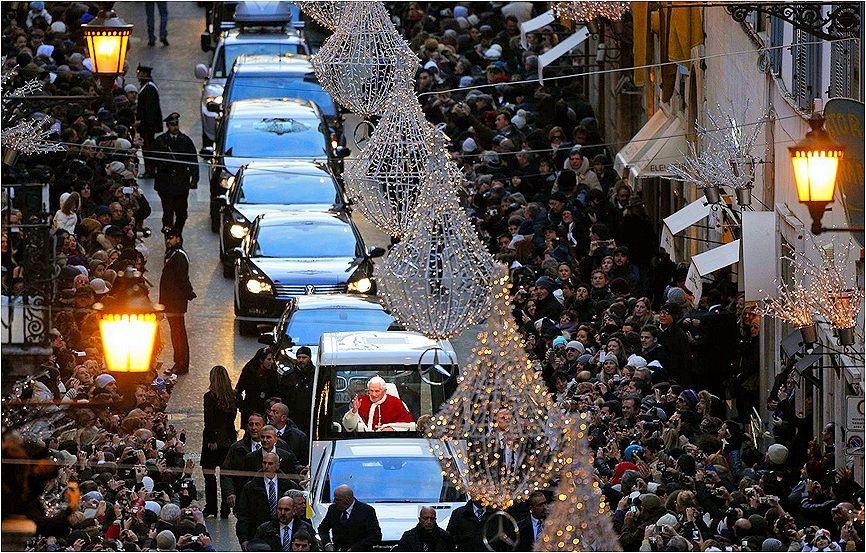
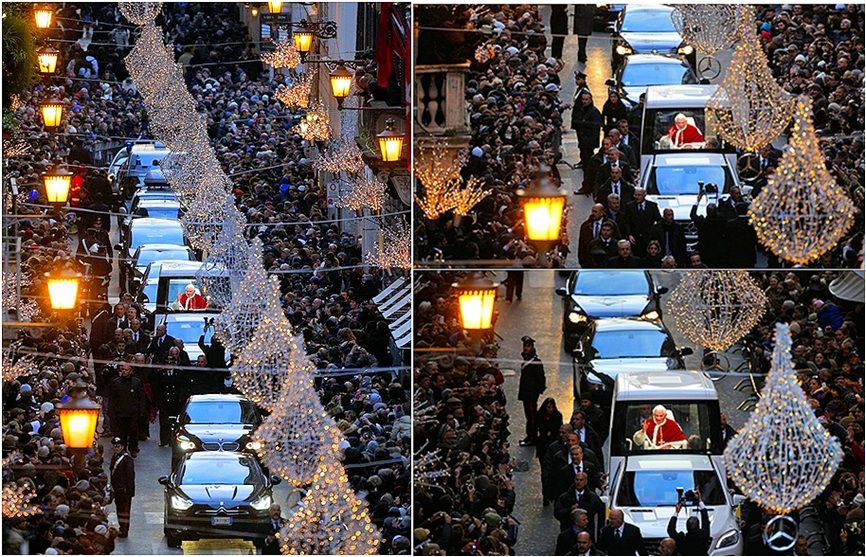
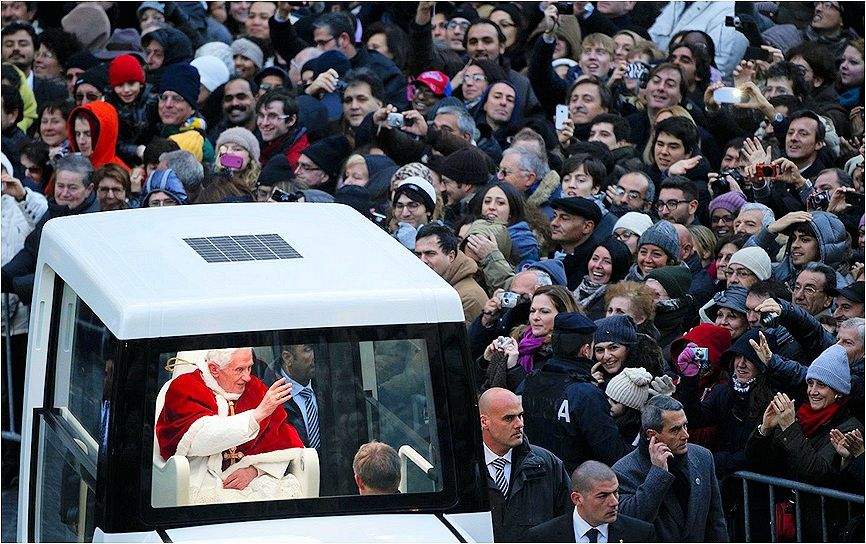

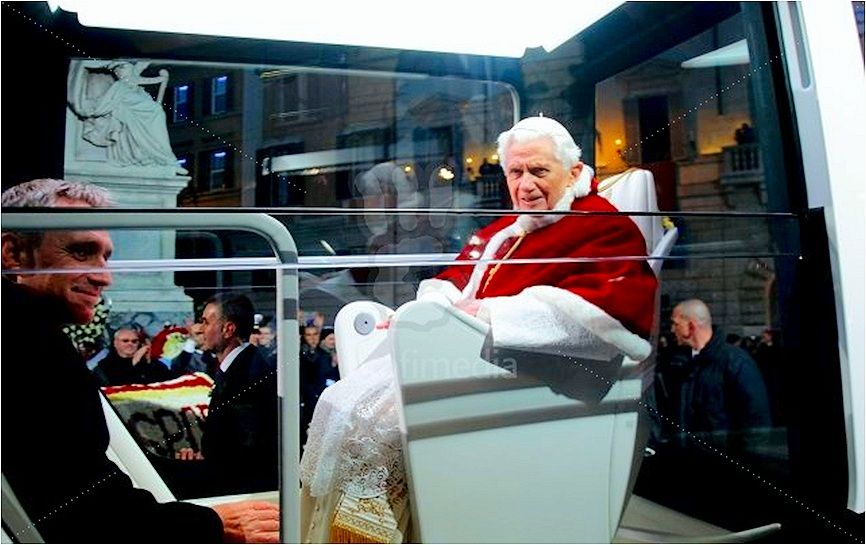
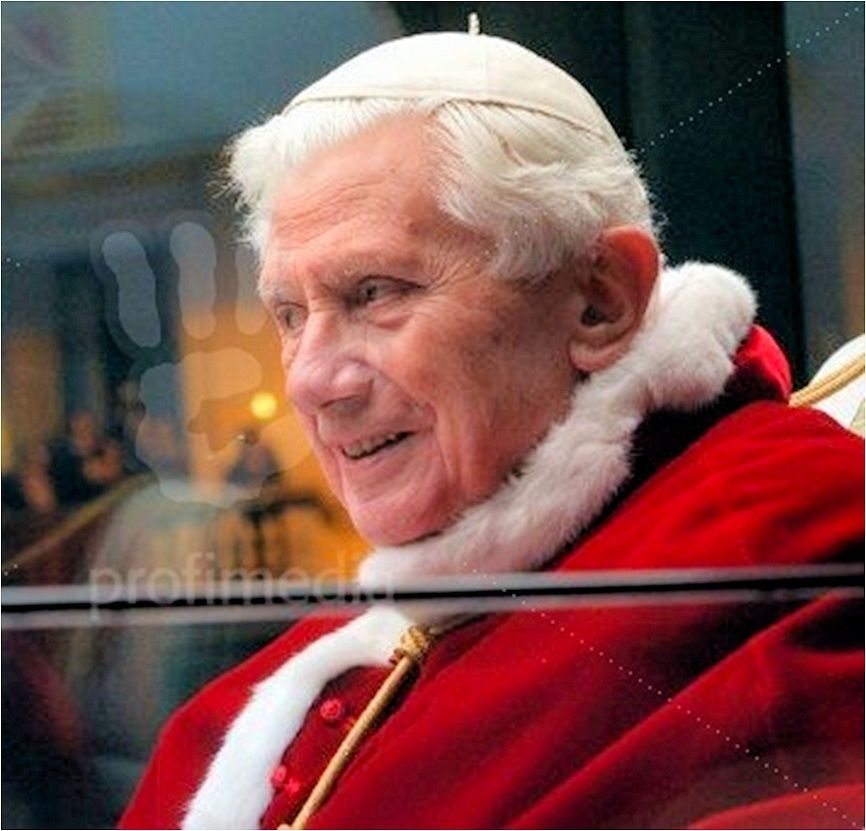 The clear bulletproof glass panels of the new Popemobile debuted today allows the Pope to be photographed - and seen - as if there were no panels at all, and that's a great improvement.
The clear bulletproof glass panels of the new Popemobile debuted today allows the Pope to be photographed - and seen - as if there were no panels at all, and that's a great improvement.
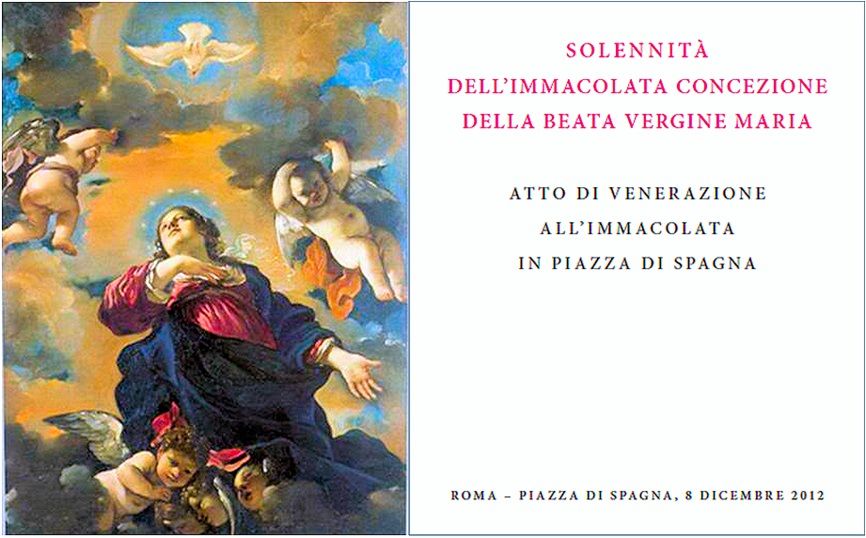
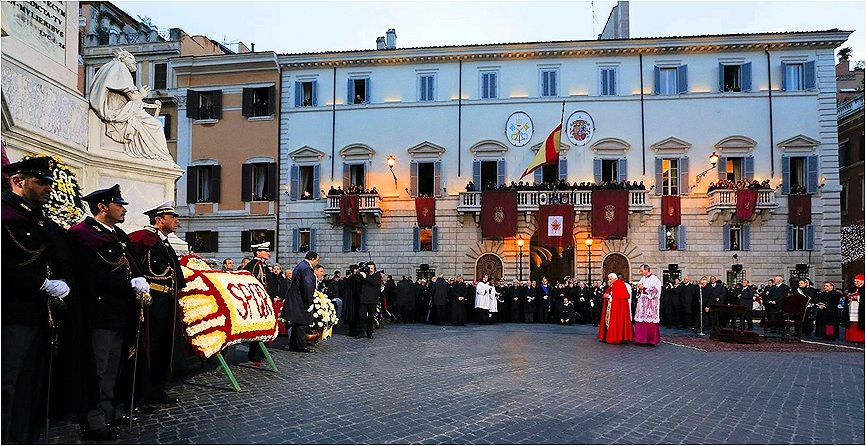
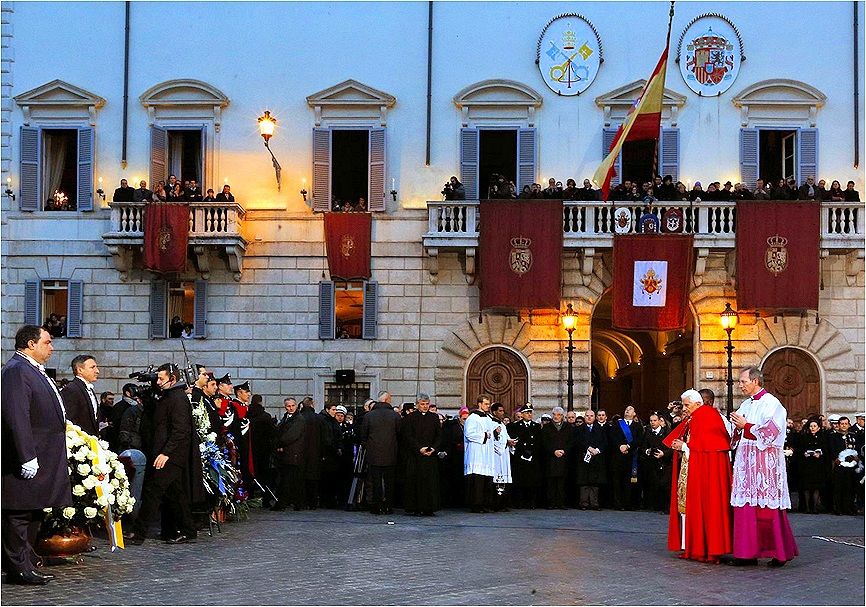 'Real joy fills the heart
'Real joy fills the heart
freed from sin' as Mary was
Adapted from the English service of

On a chilly but bright Saturday afternoon Pope Benedict XVI, to the joy of pilgrims and the curiosity of visiting Christmas shoppers to Rome, came to a packed Piazza di Spagna at the foot of Rome's famous Spanish Steps, to pay homage to Mary on the feast of the Immaculate Conception.
A pillar surmounted by a statue of "L'Immacolata", as the Italians refer to her, dominates the square adjoining the Italian capital's priciest shopping district.
Following a reading from the Book of Revelation, the Holy Father addressed the gathered faithful and visitors by the statue of Our Lady, telling them what a joy it was to be in Piazza di Spagna on this feast day in the Year of Faith.
In the first of three points on the Immaculate Conception, the Pope noted that the encounter between the divine messenger and the Immaculate Virgin goes completely unnoticed = nobody knows about it, and nobody talks about it.
He noted if this great event was to happen in our time, “it would not leave traces in newspapers and magazines, because it is a mystery that happens in silence.” And yet, he said, what often goes unnoticed “is more fruitful than the frenetic pace that characterizes our city.”
The statue Mary in the centre of Rome, he pointed out, “reminds us that God's voice is not recognized in the noise and agitation”, but his design for our personal and social life is not superficial, but goes to a where the essential forces are neither economic nor political, but moral and spiritual.
In his second point, the Holy Father underlined that the Immaculate Conception also reminds us that the salvation of the world is not the work of man - not of science, technology, ideology - but it is the work of God's grace.
His third point was that the Immaculate Conception speaks of joy, the real joy that fills a heart freed from sin. Mary's joy is full, he said, because in her heart there is no shadow of sin.
The Pope called on the faithful to learn to say No to the voice of selfishness, and to say Yes to authentic love.
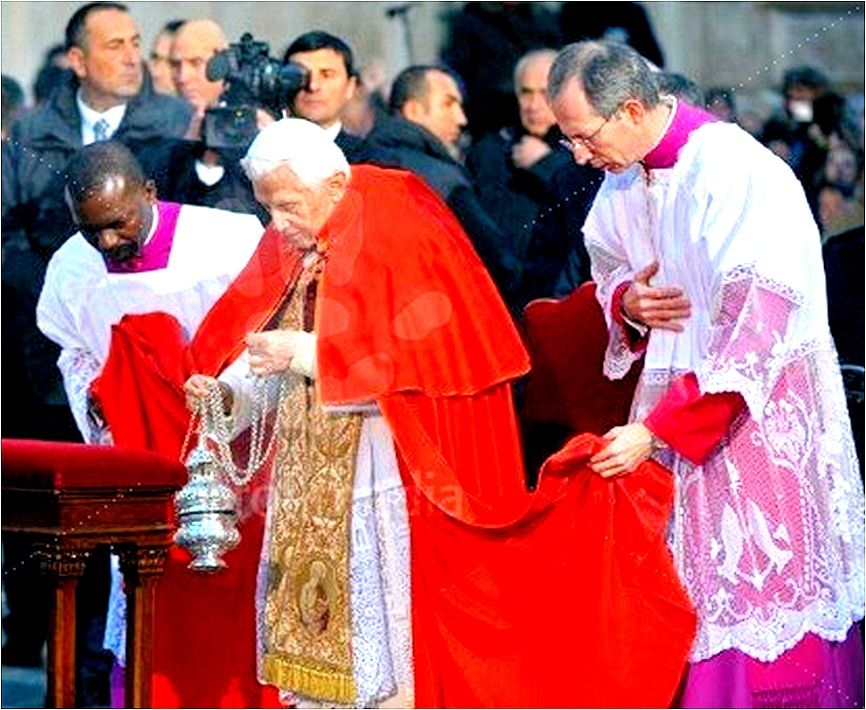
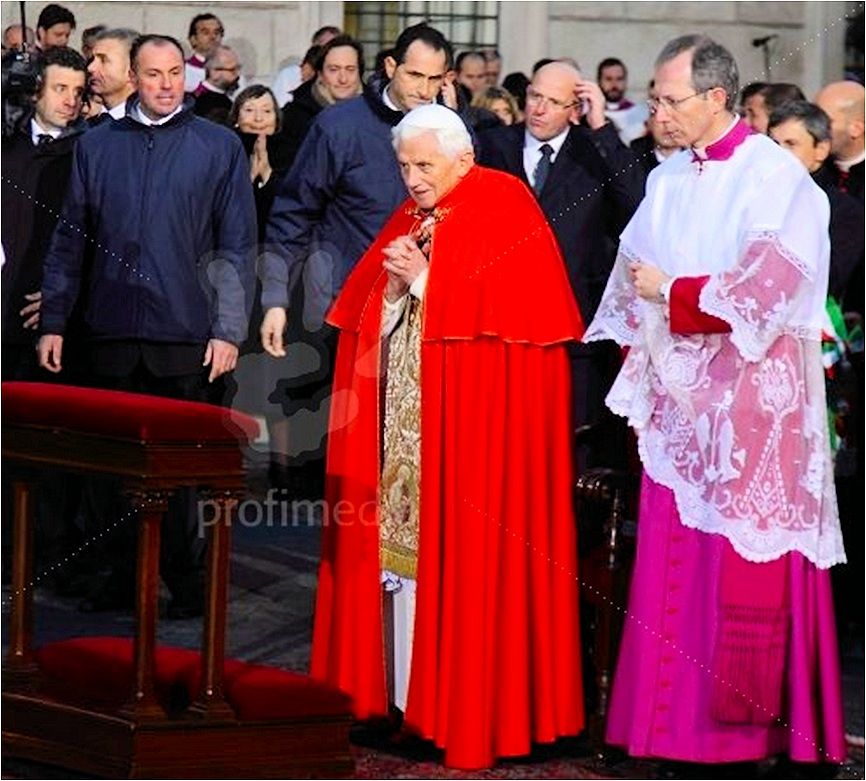
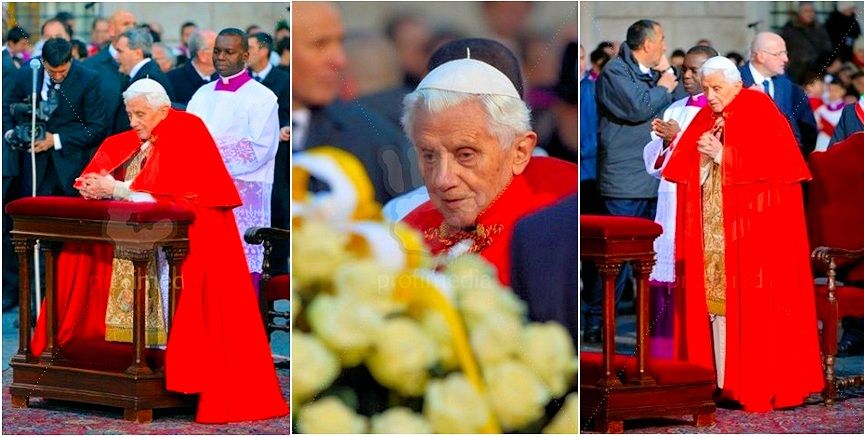
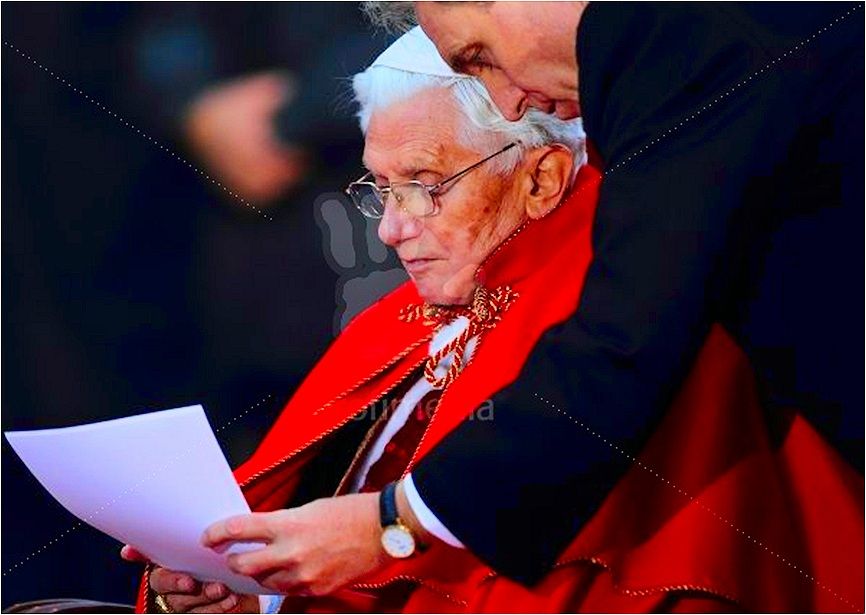
Here is a translation of the Pope's address:
Dear brothers and sisters,
It is always a special joy to be gathered here in Piazza di Spagna on the feast of Mary Immaculate. To find ourselves together - Romans, pilgrims and visitors - at the foot of the statue of our spiritual Mother makes us feel united in the sign of the faith, which I am happy to underscore in this Year of Faith .
I greet you with great affection and would like to share with you some simple thoughts suggested by the Gospel on this Solemnity - the Gospel of the Annunciation.
First of all, it always strikes us and makes us reflect on the fact that what was the decisive moment for the history of mankind - the moment when God became man - took place in great silence. The encounter between the divine messenger and the Immaculate Virgin took place completely unnoticed - no one knew, no one talked.
If this event had happened in our time, it would not have left any trace in newspapers and magazines, because it is a mystery that takes place in silence. That which is truly great often passes unobserved, and such a quiet silence shows itself to be even more fruitful in the frenetic agitation that characterizes our cities, but which - adjusting for measure - was already known in important cities like the Jerusalem of Jesus's time.
Such activism makes us incapable of stopping, of being tranquil, of listening in that silence in which the Lord makes himself discreetly heard.
Mary, on the day she received the angel's announcement, was gathered into herself but at the same time open to listening to God. In her, there was no obstacle, no screen, nothing that separated her from God.
This is the meaning of her being without original sin: her relationship with God was free of the least possible taint - there was no separation, not a hint of selfishness - only perfect harmony. Her small human heart was completely centered in the great heart of God.
And sop, dear brothers, coming here, to this monument to Mary in the heart of Rome, reminds us first of all that the voice of God cannot be recognized in a din nor in agitation. We cannot perceive his plan for our personal and social life by remaining superficial, but by going into a more profound level where the forces that act are not economic and political but moral and spiritual. That is where Mary invites us to plumb and to keep ourselves attuned to God's action.
There is a second thing that is even more important that the Immaculate tells us when we come here. Namely, that the salvation of man is not the work of man - not of science nor technology nor ideology - but it comes from Grace.
What does this word mean? Grace means Love in all its purity and beauty. It is God himself as he revealed himself in the salvific history narrated in the Bible, and completely so in Jesus Christ.
Mary is called 'full of grace' (Lk 1,28), and with this identity, she reminds us that the power of God's love is stronger than evil, that it can fill up the empty spaces that selfishness provokes in the story of persons, families, nations, the world.
This empty spaces can become hell, in which human life is pulled down towards nothing, where it loses meaning and light. The false remedies that the world proposes to fill up this emptiness - drugs are emblematic - actually just widen the abyss.
Only love can save man from this fall, but not just any love: it must be a love than has the purity of Grace - of God who transforms and renews - and can therefore place new oxygen, clean air, new life energy, into lungs that have been intoxicated.
Mary tells us that no matter how low man falls, it is never too low for God, who descended to hell. no matter how our heart has lost its way, "God is always greater than our heart" (1Jn 3,20). The gentle breath of Grace can dispel the darkest clouds, it can make like beautiful and rich with meaning even in the most inhuman situations.
This gives rise to the third thing that Mary Immaculate tells us: She speaks to us of joy, that authentic joy that fills a heart that is free of sin. Sin carries with it a negative sadness that leads one to close up into himself. Grace brings true joy which does not depend on possession of things but is rooted in one's deepest intimacy and which nothing and no one can take away.
Christianity is essentially a 'Gospel', 'good news' - though some think it is an obstacle to joy because they see in it a collection of prohibitions and regulations.
In fact, Christianity is the announcement of the victory of Grace over sin, of life over death. And if it carries with it renunciations and a discipline of the mind, the heart and one's behavior, it is precisely because man has the poisonous root of selfishness which does harm to himself and to others.
Therefore, one must learn to say No to the voice of selfishness and Yes to the voice of authentic love. Mary's joy is full, because there was no shadow of sin in her heart. This joy coincides with the presence of Jesus in her life: Jesus who was conceived and carried in her womb, then a child entrusted to her maternal care; Jesus whom she saw leaving home, but whom she followed from a distance with faith, up to the Cross and his Resurrection. Jesus was the joy of Mary as he is the joy of the Church, and all of us.
During this season of Advent, Mary Immaculate teaches us to listen to the voice of God who speaks in silence; to welcome his grace, which liberates us from sin and every selfishness;and thus, to savor true joy. Mary, full of grace, pray for us!
!
Thanks to Gloria for some of the photos showing the rite... The Yahoo newsphoto file does not have them at all...[Modificato da TERESA BENEDETTA 10/12/2012 08:03] |
| |
 10/12/2012 04:21 10/12/2012 04:21 |
|
| | | OFFLINE | | Post: 25.904
Post: 8.397 | Registrato il: 28/08/2005
Registrato il: 20/01/2009 | Administratore | Utente Master | |
|

 ANGELUS
ANGELUS
Second Sunday of Advent
Adapted from the English service of

December 9, 2012
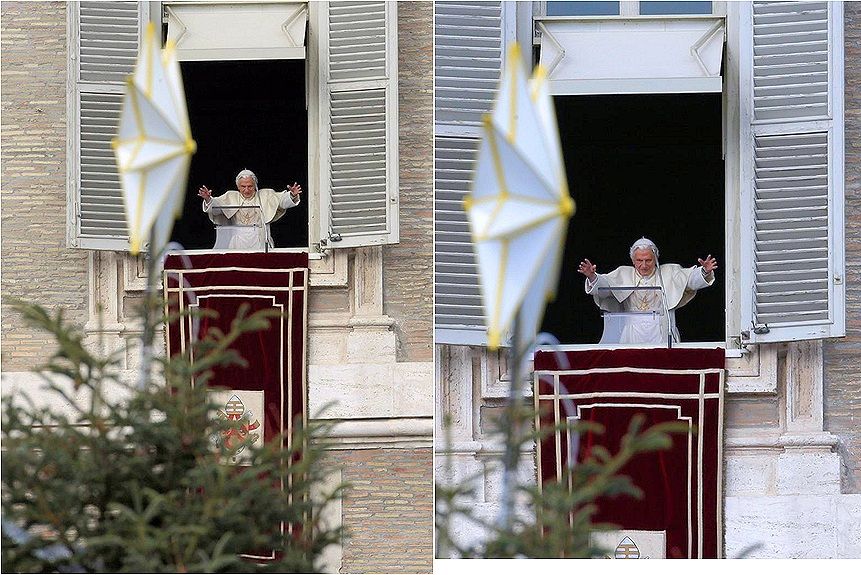
Thousands of pilgrims wrapped in scarves and hats withstood a gelid northerly wind that swept St Peter’s Square Sunday to pray the midday Angelus prayer with Pope Benedict XVI, who urged them to prepare their hearts and lives for the coming of the Lord.
On the second Sunday of Advent, the Pope dwelt on the figure of John the Baptist, as presented in Luke’s Gospel, saying that, after Mary, he was the figure most associated by Christians with Advent.
In English, he said:
In today’s Gospel John, the Baptist reminds us of the need for repentance and purification as we prepare a way for the Lord and await in hope his coming in glory. May God abundantly bless you and your loved ones!
He spoke of him as ‘the voice crying out in the desert' = even today, in the desert of consumerist society, “where we seek joy in things”. Instead the Baptist teaches us to live in an essential way, so that Christmas is not only experienced as an outward celebration, but as the feast of the Son of God who came to bring peace, life and true joy to people.
“Our aim today,” he continued “is to listen to that voice, to give room for Jesus and to welcome him, the Word that saves us, to our hearts”.
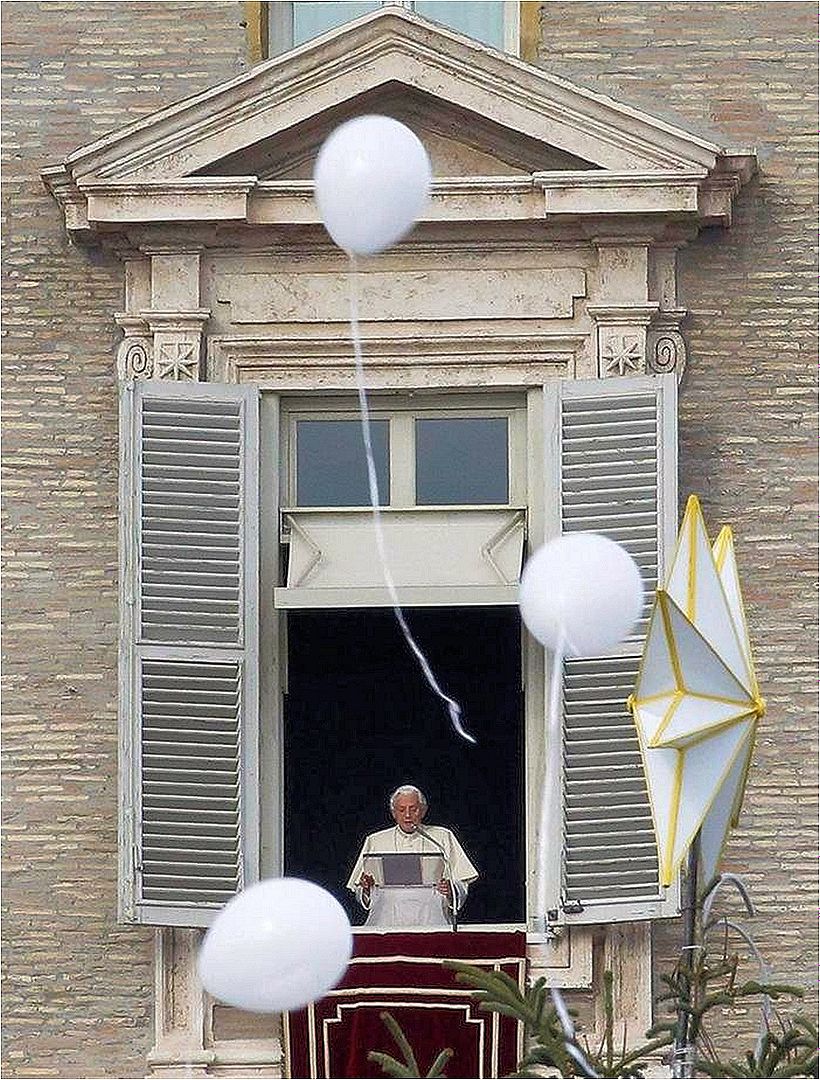
Here is a translation of the Holy Father's words at the Angelus today:
Dear brothers and sisters,
In the season of Advent, the liturgy highlights in a special way two figures who prepare the coming of the Messiah: the Virgin Mary and John the Baptist.
Today, St. Luke presents us the latter, and he does so with characteristics that are different from the other evangelists.
"All the four Gospels place the figure of John the Baptist at the start of Jesus's public activity and present him as his precursor. St. Luke has pushed the connection between the two and their respective missions farther back... Already in their conception and birth, he places Jesus and John in relation to each other" (L’infanzia di Gesù, 23).
This helps us understand that John, as the son of Zachary and Elizabeth, both from families of priests, is not just the last of the prophets, but he also represents the entire priesthood of the Old Testament, and thus, he prepares men for the spiritual worship of the New Covenant which was inaugurated by Jesus (cfr ibid. 27-28).
Moreover, Luke also discredits every mythical reading that is often made of the Gospels by situating the Baptist's life historically - "in the fifteenth year of the reign of Tiberius Caesar, when Pontius Pilate was governor of Judea... during the high priesthood of Annas and Caiaphas. (Lk 3,1-2).
It is within this historical framework that the truly great event takes place - the birth of Christ, which was not even noted by his contemporaries. For God, the 'great' figures of history provide a frame for the little ones.
John the Baptist is described as "a voice of one crying out in the desert: 'Prepare the way of the Lord, make straight his paths!'" (Lk 3,4). The voice proclaims the words, but in this case, the Word of God came ahead, having descended on John, son of Zachary, in the desert (cfr Lk 3,2).
Thus he has a great role, but always as a function of Christ. As St. Augustine comments, "John is a voice. But of the Lord, it has been said, 'In the beginning was the Word'. John is the voice that passes, Christ is the eternal Word who was from the beginning. If words are taken from a voice, what remains? A vague sound. A voice without words strikes the ear but does not edify the heart" [Discourse 293, 3: PL 38, 1328).
It is our task today to heed that voice of John in order to grant room and welcome in our hearts for Jesus, the Word that saves us. During this season of Advent, let us prepare ourselves to see, with the eyes of faith, 'the salvation of God' in that humble cave in Bethlehem (cfr Lk 3,6).
In the consumer society, which attempts to find joy in things, the Baptist teaches us to live in an essential way, so that Christmas may be experienced not just as an exterior feast, but as the Feast of the Son of God who has come to bring peace, life and true joy to men.
Let us entrust our journey towards the Lord who is coming, to the maternal intercession of Mary, so that we may be ready to welcome, in our hearts and into our whole life, Emmanuel, God-with-us.[DIM]
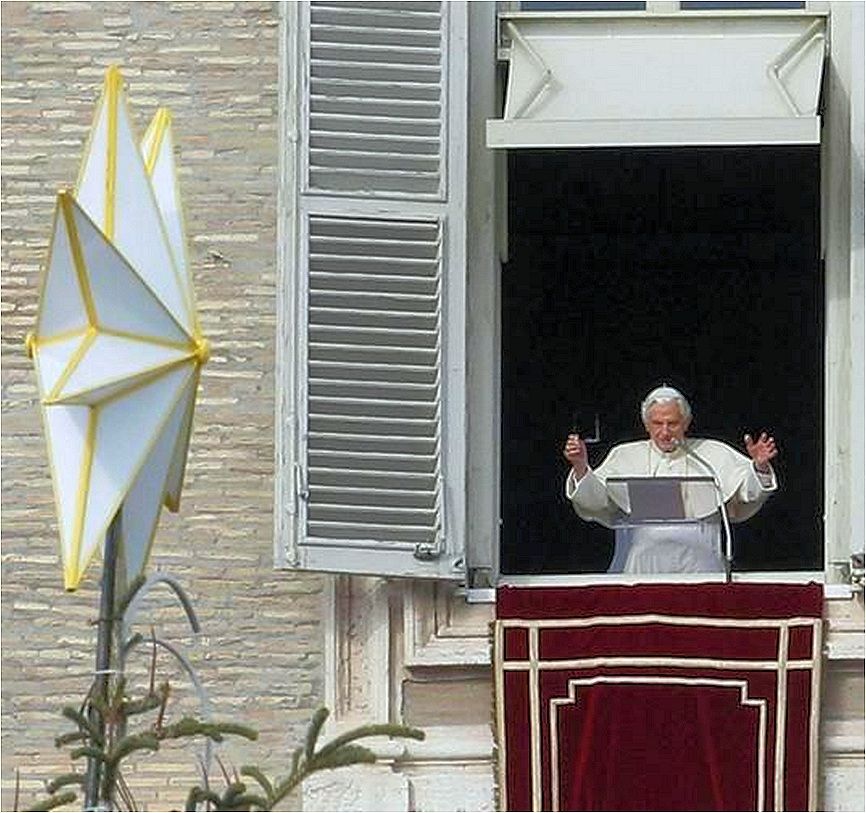
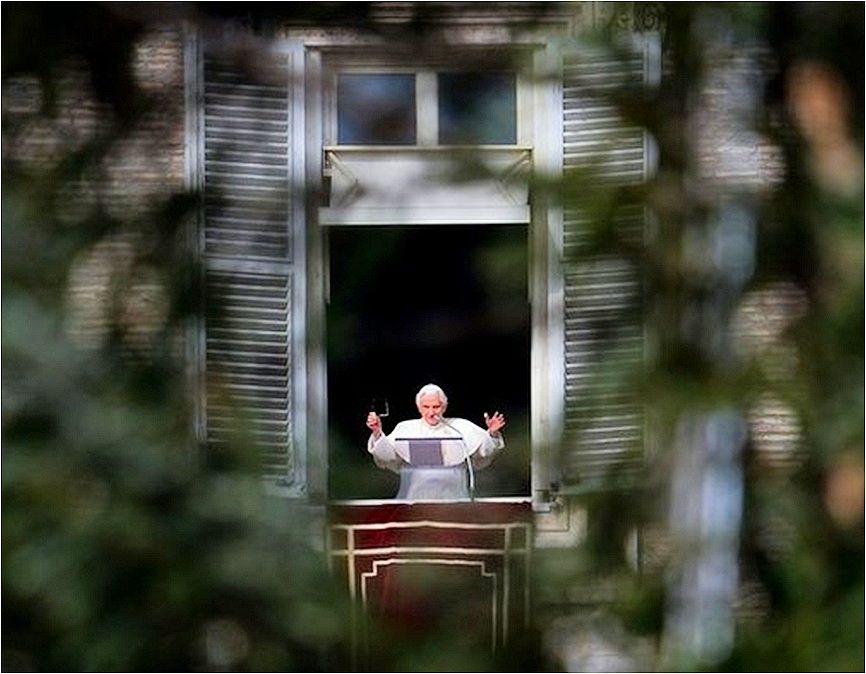
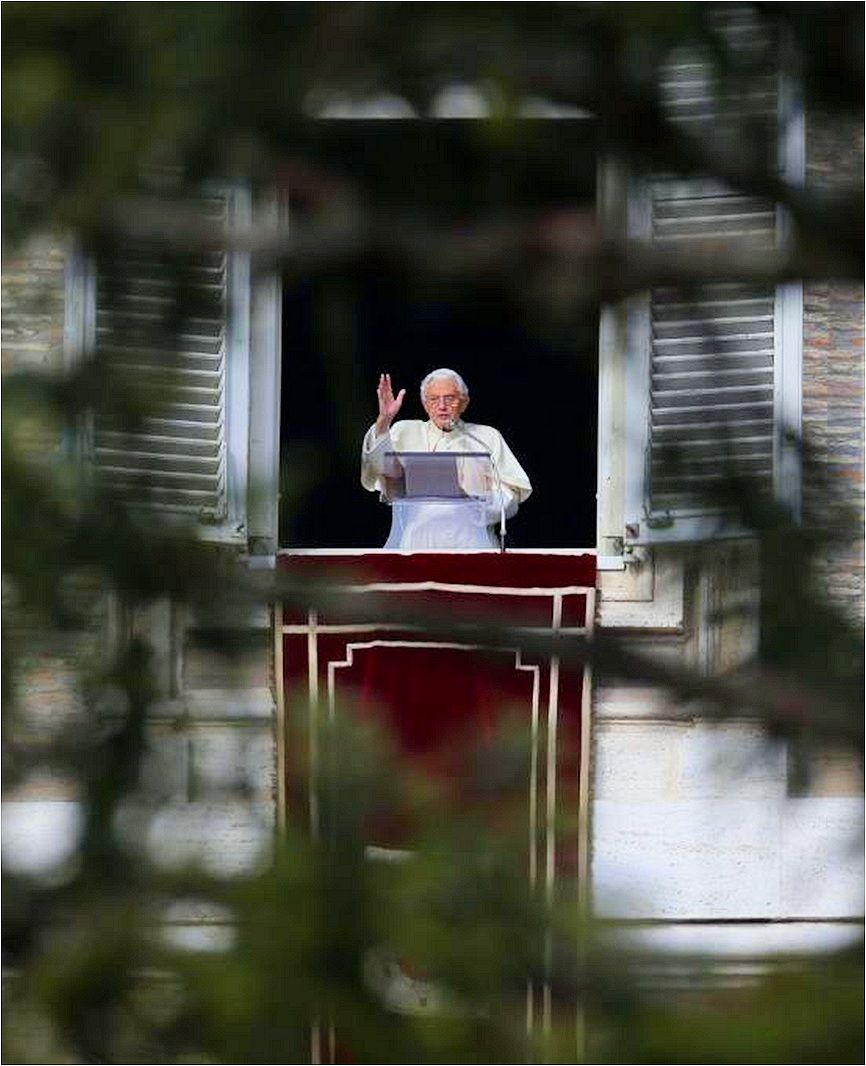
[Modificato da TERESA BENEDETTA 10/12/2012 07:04] |
| |
 10/12/2012 06:21 10/12/2012 06:21 |
|
| | | OFFLINE | | Post: 25.905
Post: 8.398 | Registrato il: 28/08/2005
Registrato il: 20/01/2009 | Administratore | Utente Master | |
|
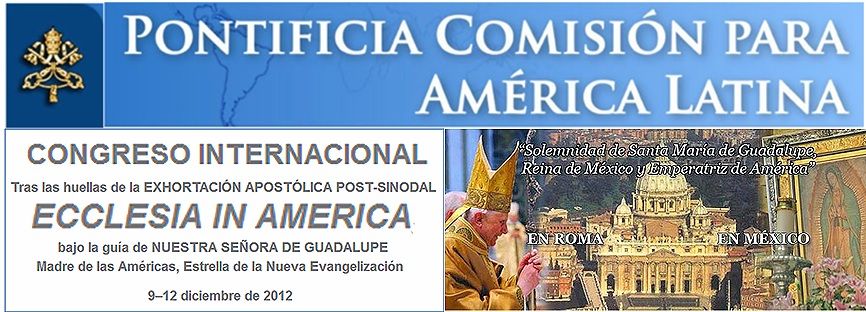 Pope tells bishops of the Americas
Pope tells bishops of the Americas
that the Church needs 'irreplaceable'
contributions of their faithful
Adapted from the English service of

December 9, 2012
In an appearance that had not been pre-announced, Pope Benedict XVI addressed the cardinals, bishops, priests, religious and laity from the American continents, after the opening Mass Sunday afternoon of the International Congress on the Church in America, marking 15 years since Blessed John Paul II's Apostolic Exhortation following the 1990 Bishops' Synodal Assembly on the Americas.
He told them that “the universal Church expects and needs the missionary spirit, zealous generosity and irreplaceable contribution” of the Church in America, North and South.
Cardinal Marc Ouellet, Prefect of the Congregation for Bishops, as well as president of the Pontifical Commission for Latin America, celebrated the Mass at the Altar of the Chair in St. Peter's Basilica. After the Mass, he joined the Pope in the sacristy and accompanied him to the Altar of the Chair to address the assembly.
For the first time, the Pope was wheeled into the basilica on a lower mobile platform equipped with a chair.
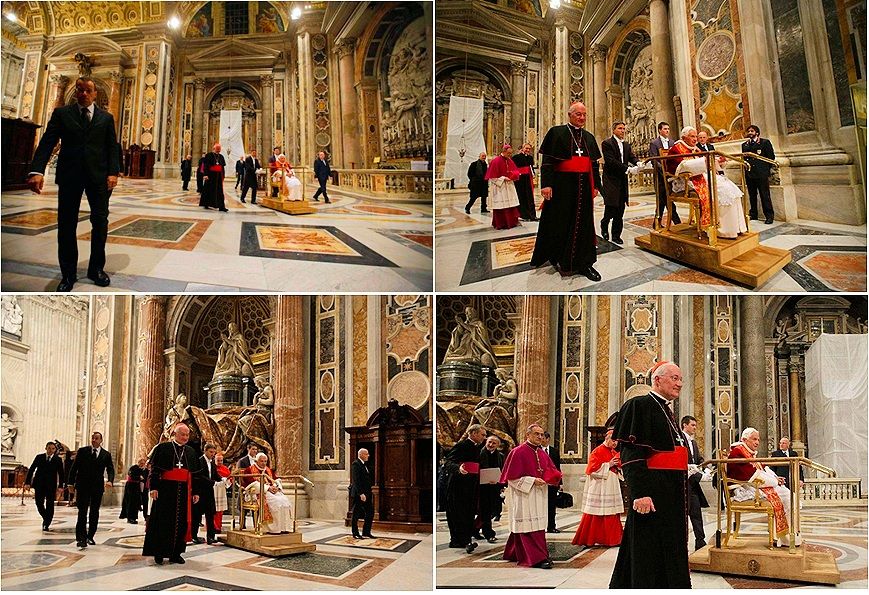 [This novelty appeared to have monopolized the news photographers' attention, as the Yahoo newsphoto service only has two generic photos of the Pope presumably at the altar, none at all of the assembly, and two photo series on the Pope arriving and leaving on the platform.]
[This novelty appeared to have monopolized the news photographers' attention, as the Yahoo newsphoto service only has two generic photos of the Pope presumably at the altar, none at all of the assembly, and two photo series on the Pope arriving and leaving on the platform.]
In his address, the Pope noted that the post-Synodal Apostolic Exhortation, Ecclesia in America, cited challenges and difficulties that are still current, such as secularism and Christian sects which are proliferating and attracting their members from disaffected Catholics.
The Pope underscored the urgent need to educate the faithful in 'a culture of life' in order to counter the spread of a mentality “that undermines the dignity and protection of life” and does not favor the institutions of marriage and family. But he also touched on other outstanding social problems in the Americas.

Here is the full text of the Pope's address, the first half of which was delivered in Spanish. [That explains why the English service of Vatican Radio was only able to reproduce the English part...]
Eminences,
Dear Brothers in the Episcopate and Priesthood,
Esteemed Knights of Columbus:
I am very grateful for the words of Cardinal Marc Ouellet, president of the Pontifical Commission for Latin America, an d I am happy that, together with the Knights of Columbus, he wished to promote this International Congress in order to deepen reflection and concrete projection of the Post-Synodal Apostolic Exhortation Ecclesia in America by the Blessed John Paul II, which synthesizes the contributions of the 1990 Special Assembly of the Bishops' Synod on the Americas.
I greet the cardinals,bishops, priests and consecrated persons, as well as the many lay faithful who have come to take part in this important initiative.
Your faces bring me back in mind and heart the heartbeat of the American continent, ever [resent in the Pope's prayers, and whose devotion to the Apostolic See I have gratefully experienced, not just during my apostolic visits Vuestros rostros me traen nuevamente a la to some of your countries, but every time that I meet here with the pastors and faithful of your beloved lands.
My venerated predecessor, Blessed John Paul II, had the clear-sighted intuition to increase the relationships of cooperation among the local Churches in all the Americas - North, South and Central - and at the same time, to inspire better solidarity among nations.
Today, those proposals deserve to be taken up again so that the redeeming message of Christ may be put into practice with greater intensity and that it may produce abundant fruits of holiness and ecclesial renewal.
The theme that guidedthe reflections of the 1990 Synodal Assembly could also serve as inspiration for your work in the coming days: "The encounter with the living Christ - the way to conversion, communion and solidarity in America".
In effect, love for the Lord Jesus and the power of his grace must continue to take root intensely in the hearts of men, families and the Christian communities of your nations, in order for them to advance with dynamism along the paths of concord and just progress.
That is why it is a gift of Providence that your Congress takes place shortly after the start of the Year of Faith and after the General Assembly of the Synod which was dedicated to the new evangelization. Your deliberations will contribute valuably to the arduous and imperious task of making the Gospel of Christ resound with clarity and daring.
The aforementioned Exhortation already indicated challenges and difficulties which continue to be present today with singularly complex characteristics. Indeed, secularism and various religious groups are expanding on all sides, giving rise to numerous problems.
Education and the promotion of a culture of life constitute a fundamental urgency in the face of the spread of a mentality that attacks the dignity of the person and does not favor protection of the institutions of marriage and the family.
How can we not worry about the painful situations of migration, uprooting of peoples, or violence, especially those caused by organized crime, drug trafficking, corruption and the arms trade? What about the searing inequalities and pockets of poverty caused by questionable economic, political and social measures?
He continued in English:
All these important questions require careful study. Yet in addition to their technical evaluation, the Catholic Church is convinced that the light for an adequate solution can only come from encounter with the living Christ, which gives rise to attitudes and ways of acting based on love and truth. This is the decisive force which will transform the American continent.
Dear friends, the love of Christ impels us to devote ourselves without reserve to proclaiming his Name throughout America, bringing it freely and enthusiastically to the hearts of all its inhabitants.
There is no more rewarding or beneficial work than this. There is no greater service that we can provide to our brothers and sisters. They are thirsting for God.
For this reason, we ought to take up this commitment with conviction and joyful dedication, encouraging priests, deacons, consecrated men and women and pastoral agents to purify and strengthen their interior lives ever more fully through a sincere relationship with the Lord and a worthy and frequent reception of the sacraments.
This will be encouraged by suitable catechesis and a correct and ongoing doctrinal formation marked by complete fidelity to the word of God and the Church’s magisterium and aimed at offering a response to the deepest questions and aspirations of the human heart.
The witness of your faith will thus be more eloquent and incisive, and you will grow in unity in the fulfilment of your apostolate. A renewed missionary spirit and zealous generosity in your commitment will be an irreplaceable contribution to what the universal Church expects and needs from the Church in America.
As a model of openness to God’s grace and of perfect concern for others, there shines forth on your continent the figure of Mary Most Holy, Star of the New Evangelization, invoked throughout America under the glorious title of Our Lady of Guadalupe.
As I commend this Congress to her maternal and loving protection, I impart to you, the organizers and participants, my Apostolic Blessing as a pledge of abundant divine graces.
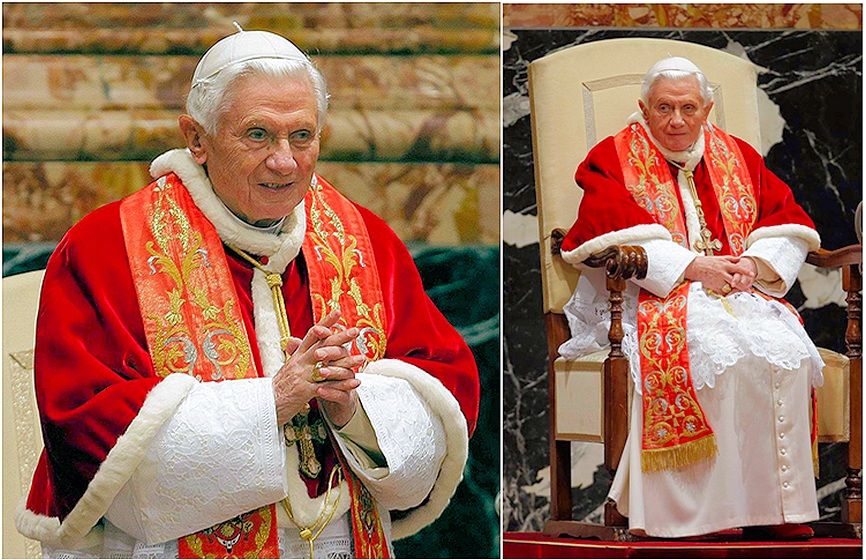
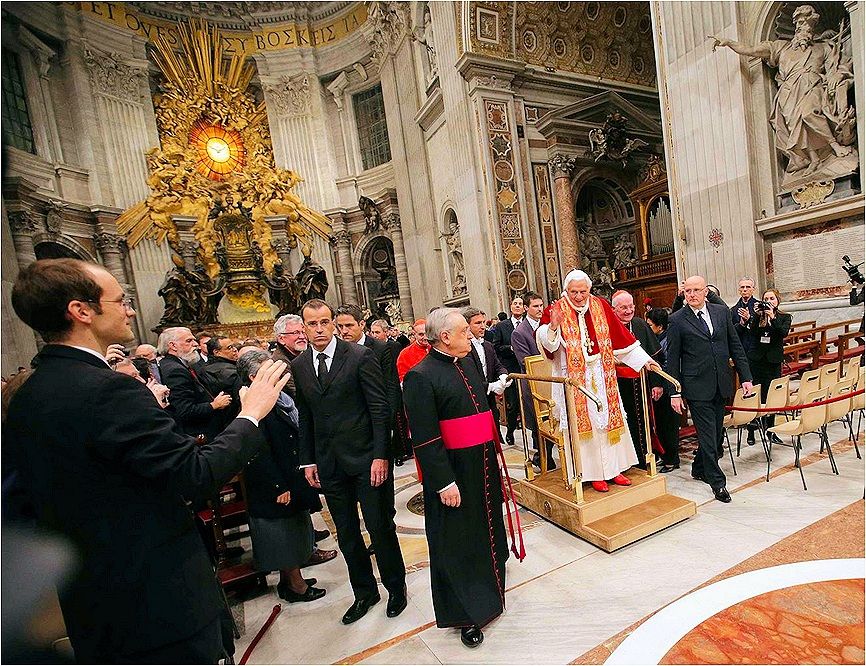
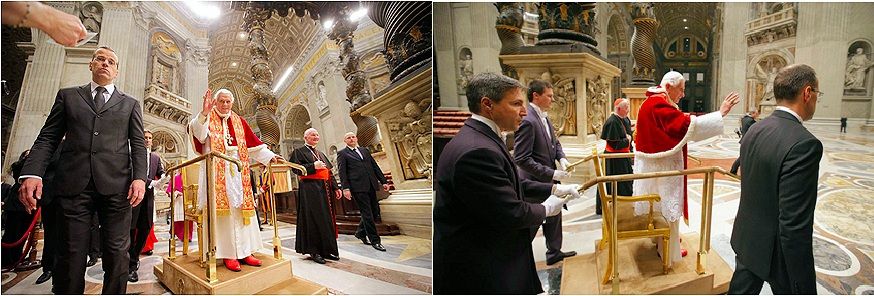
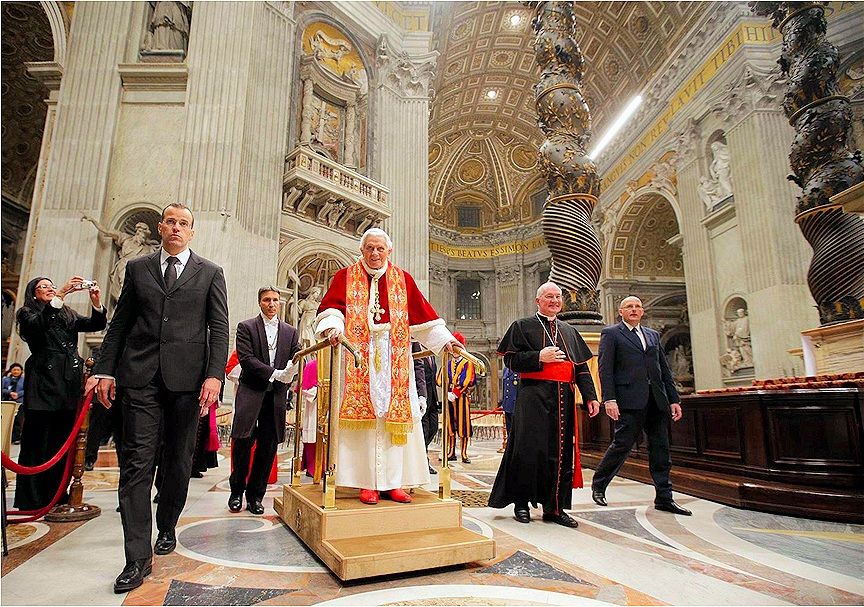 Two practical considerations about the mobile platform used today. 1) It is large enough to accommodate a chair, which the Pope used going to the Altar of the Chair. Because there was no congregation in the nave as there is during a Papal liturgy, there was no need for the Pope to be standing up during the more than 500-meter distance from the sacristy to the Altar of the Chair. 2) For the the same reason, the platform can be low because there is no need for him to stand high above the floor when there is no large congregation who must be able to see him conveniently.
Two practical considerations about the mobile platform used today. 1) It is large enough to accommodate a chair, which the Pope used going to the Altar of the Chair. Because there was no congregation in the nave as there is during a Papal liturgy, there was no need for the Pope to be standing up during the more than 500-meter distance from the sacristy to the Altar of the Chair. 2) For the the same reason, the platform can be low because there is no need for him to stand high above the floor when there is no large congregation who must be able to see him conveniently.
But as usual, our Caterina also noticed a detail showing that this platform was one used by John Paul II - because the frame around the bottom carries his papal seal:
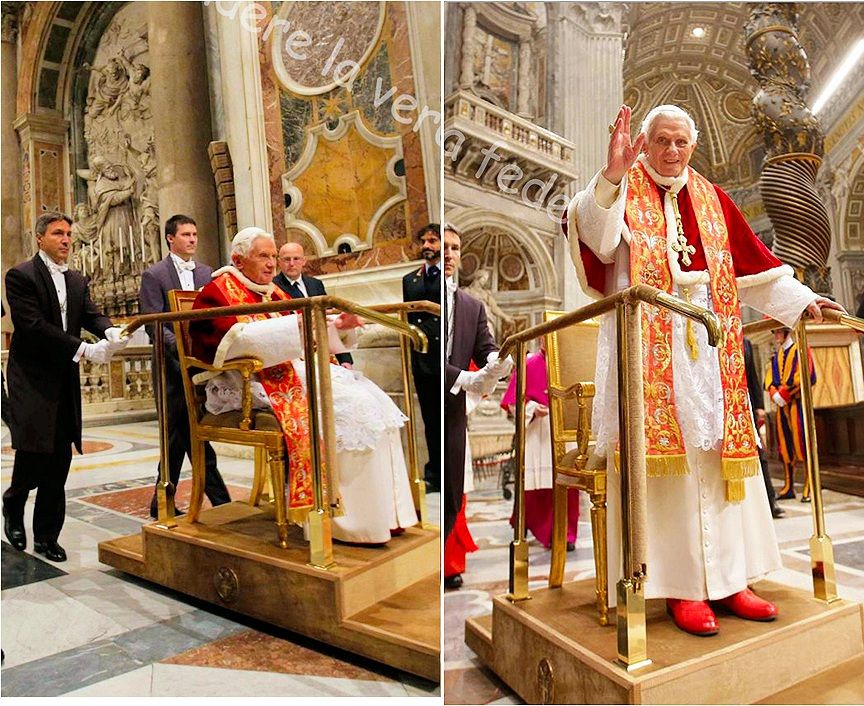 As much as one is saddened by the gradual and natural toll that age is taking on the Holy Father's physical strength, one must thank God that he does not appear to have any serious health problem, and that he is obviously very prudent about conserving his energies. May God keep him healthy and well for many more years to come. [Remember Leo XIII!] AD MULTOS ANNOS, SANCTE PATER!
As much as one is saddened by the gradual and natural toll that age is taking on the Holy Father's physical strength, one must thank God that he does not appear to have any serious health problem, and that he is obviously very prudent about conserving his energies. May God keep him healthy and well for many more years to come. [Remember Leo XIII!] AD MULTOS ANNOS, SANCTE PATER!
[Modificato da TERESA BENEDETTA 10/12/2012 22:57] |
| |
 10/12/2012 15:29 10/12/2012 15:29 |
|
| | | OFFLINE | | Post: 25.906
Post: 8.399 | Registrato il: 28/08/2005
Registrato il: 20/01/2009 | Administratore | Utente Master | |
|


 Monday, Dec. 10, Second Week in Advent
Monday, Dec. 10, Second Week in Advent
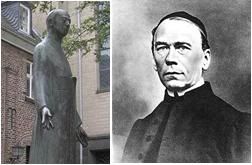 BLESSED ADOLPH KOLPING (Germany, 1813-1865), 'Father of all apprentices'
BLESSED ADOLPH KOLPING (Germany, 1813-1865), 'Father of all apprentices'
Son of a peasant, he was a shoemaker before becoming a priest.
In Cologne, he set up the first workmen's society that promoted
the value of family life and the dignity of labor. His apostolate
with laborers was similar to John Bosco's with the urban young.
By the time he died, there were >400 Kolpingfamilien societies
in Germany. Today there are Kolpingwerk societies in 54 countries
of the world. He is buried in Cologne Cathedral and was beatified in 1991.
In some calendars, today is also dedicated to
The Servant of God BERNARDO DI QUINTAVALLE (d 1246), first follower of St. Francis of Assisi

Declared ‘Minorum Ordinis prima plantula’ (first fruits of the Minor Order of Friars), Bernard had been Francis’s first follower. A wealthy man of Assisi, he invited Francis to stay at his house one night, during which he saw that the young man gave up sleep to pray all night. Convinced of Francis’s holiness, he asked to be a disciple. Francis joyfully took him to the church where they attended Mass and then asked the priest to open the Bible three times. Three passages appeared: "If you wish to be perfect, go, sell what you have and give to the poor" (Matthew 19:21). "Take nothing for the way" (Mark 6:8). "If any man will come after Me, let him deny himself and take up his cross and follow Me" (Matthew 16:24). Francis said: "This will be the rule of life which we and all those who will join us shall follow." At that, Bernard sold all his possessions and divided the money among the poor. Francis came to trust in the older man who also proved to be holy. He sent him on missions to other cities and later, took him along on the trip to Africa to preach to the Muslims. But along the way they met a poor sick man and Francis left the ever-joyful Bernard to care for the man until he himself would return. In 1210, Francis chose Bernard to lead the first group of friars who went to Rome to ask for the approval of the Order's rule. Before his death Francis gave Bernard a special blessing and asked all of the brothers to have respect for this holy man. Bernard is buried in Assisi near his holy founder in the Basilica of St. Francis. [I have been unable to find out so far why Bernard was not beatified like the other early disciples of Francis.]
Readings for today's Mass:
www.usccb.org/bible/readings/121012.cfm
No events announced today for the Holy Father.
[Modificato da TERESA BENEDETTA 10/12/2012 15:33] |
| |
 10/12/2012 22:17 10/12/2012 22:17 |
|
| | | OFFLINE | | Post: 25.907
Post: 8.400 | Registrato il: 28/08/2005
Registrato il: 20/01/2009 | Administratore | Utente Master | |
|
 The Pope and Twitter:
The Pope and Twitter:
Tweets won't save the world
but they can spread the Word

December 8, 2012
The new tweeter came out on the digital continent to tweet. Some inhabitants on the continent said: “What is this intruder doing here? In this field we are the only ones who know what it is and how to tweet!”. And they made fun of him and turned their backs.
Other inhabitants said: “Interesting and fun! Let’s see if he will have more followers than other VIPs, actors or footballers!" And they made their considerations based on numbers, but they didn’t think of what the tweets were saying and after a while they lost interest.
Others said: “OK. There’s someone out there who wants to tell us things that they consider important for every one of us. We will all be watching to see and hear, and we will be happy to tweet back, to our friends who are searching like us”. And the tweets bore fruit and multiplied, by thirty, by sixty, percent… Those who have ears, may they hear.
140 characters – the number contained in a tweet – are quite a few. Most of the verses of the Gospel have less; the Beatitudes are much shorter. A little concision isn’t bad. For centuries we have known that listening to the word of Jesus in the morning and bearing it in mind and heart supports the journey of a day… or of a life.
But we need to understand why this word is important, where it comes from and where it is going, in which context of life it finds its meaning. In short, a tweet doesn’t carry life alone and automatically. It might in fact meet with enthusiasm, but also refusal.
The seed falls on stony ground or among the brambles of negative prejudices and suffocates, but it also falls on good and vacant land and so it bears fruit and multiplies.
Of course the world will not be saved by tweets but among a billion baptised Catholics and among the seven billion people of the world, several million people will be able to feel the Pope is closer in this way too, hearing him say a word for them, a spark of wisdom to bear in their minds and hearts and to share with their twitter friends. A new service of the Gospel.
[Modificato da TERESA BENEDETTA 10/12/2012 22:18] |
| |
 11/12/2012 13:08 11/12/2012 13:08 |
|
| | | OFFLINE | | Post: 25.908
Post: 8.401 | Registrato il: 28/08/2005
Registrato il: 20/01/2009 | Administratore | Utente Master | |
|
 Chinese authorities said to have
Chinese authorities said to have
revoked Shanghai bishop's appointment
Mons. Ma has been under house arrest since his July ordination
when he announced he was leaving the Patriotic Association
by Wang Jicheng

SHANGHAI, Dec. 10 (AsiaNews) - For the past several months, the courageous auxiliary bishop of Shanghai, Mons. Thaddeus Ma Daqin, has been under house arrest. Ordained last 7 July, his appointment as bishop has been revoked by the government-sanctioned Bishops' Conference of the Catholic Church of China (BCCCC), according to UCA News. Sources told AsiaNews the rumours circulating to this effect are true but no official decision has yet been made public.
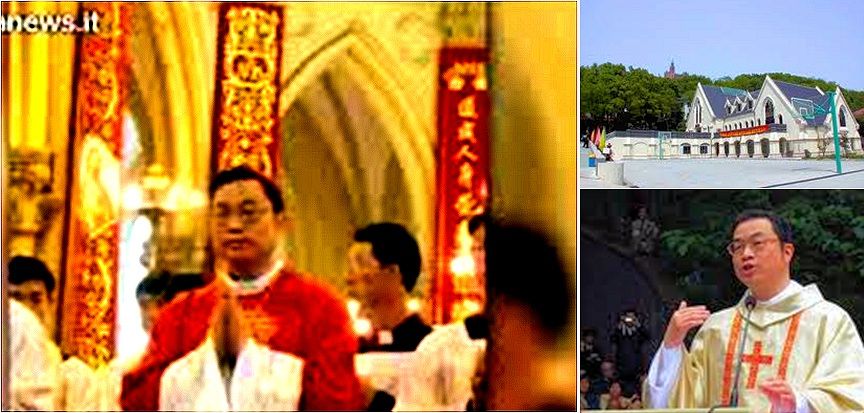 Left, Mons. Ma on his ordination as bishop; top riht, Sheshan seminary where is bein kept (the shrine to Our Lady of Sheshan may be seen on the hilltop in the background); bottom right, filephoto of Mons. Ma.
Left, Mons. Ma on his ordination as bishop; top riht, Sheshan seminary where is bein kept (the shrine to Our Lady of Sheshan may be seen on the hilltop in the background); bottom right, filephoto of Mons. Ma.
The action against the auxiliary bishop would not be a surprise. On the day of his Episcopal ordination, Mgr Ma challenged the government's 60-year Church policy by resigning from the Chinese Patriotic Catholic Association (CPCA), which controls the Church, and by refusing to share the chalice with a bishop excommunicated by the Holy See.
Worshippers present at the ceremony gave the new prelate a long- standing ovation. For many, he came to embody the courage exhibited by many Chinese priests and bishops in the face of the government's determination to promote a 'national Church' independent of Rome. However, Chinese authorities are thought to be 'terrified' by the possibility that many more bishops and priests might openly reject the CPCA, and thus undermining party control.
Right after his ordination, Mons. Ma was placed under house arrest at the diocesan seminary, near the shrine of Our Lady of Sheshan. Since then, he has been denied the right to wear the zucchetto, ring, pectoral cross and all other tokens of his Episcopal office. Recently, he was also been denied the right to co-celebrate Mass with other priests. Seminarians and nuns who helped the bishop in his act of defiance were also punished.
Founded in 1958 on the orders of Mao Zedong, the CPCA aims to set up a Chinese Church independent of the Holy See, whose bishops would be named one that would see bishops named independently of the Pope. In his Letter to Chinese Catholics in June 1977, Benedict XVI wrote that such a proposition is "incompatible with Catholic doctrine."
The Holy See does not recognise the BCCCC, which appears to have removed Mons. Ma from office, because it includes only bishops recognised by China's Communist authorities, some of whom have been excommunicated. No underground bishop is a member.
The reported action against Mons. Ma comes a few weeks after the Chinese Communist Party held its annual congress, and chose a new leadership - the fifth generation from the Old Guard that cane to power in 1948. Xi Jinping, the new party general secretary, will also become China's president in a few months.
Many analysts have praised Xi as a sober reformer who could improve the situation of religious freedom in China. However, this report about Mons. Ma would seem to indicate the opposite.
How the Ma situation fits into the overall picture of the Church in China today - five years since Benedict XVI's historic Pastoral Letter to the Catholics of China in June 2007 - may be appreciated in this exhaustive review of developments since then...
 Five years on, the Pope's letter
Five years on, the Pope's letter
to Chinese Catholics is still relevant -
and sorely lacking appropriate
response from Beijing
by Angelo S. Lazzarotto

Milan, Dec. 10 (AsiaNews) -Five years have passed since Pope Benedict XVI addressed a special Letter "to the bishops, priests, consecrated persons and lay faithful of the Catholic Church in the People's Republic of China".
Looking at the Church in China today, one may be tempted to emphasize the many problems she seems to be confronted with, forgetting the positive sides of her growth. Yet, a closer look at the changes that occurred since Pentecost 2007 can help us to better appreciate the lasting value of this papal document[1].
Even the fact that the Catholic communities in China appear today to have become a special target of the official structures can be read as a sign that some ambiguities are finally being exposed, calling for a basic riassessment.
Benedict XVI's main concern is the Church: speaking "the truth with the language of love" has made clear that within the Catholic community there is a need for a true conversion: "the purification of memory, the pardoning of wrongdoers, the forgetting of injustices suffered...are urgent steps that must be taken".
He then also underlined in a gentle and yet clear way that the current situation of "religious tolerance" is far from the "religious freedom" that is expected of a modern State.
This in the hope that some understanding may be reached, allowing the Catholic minority to contribute peacefully to the common good of the nation. Having revoked long-standing Vatican directives that made sharp distinctions allowing barriers to be set up between the so called 'underground' Catholics and those who adhere to the government sponsored Catholic Patriotic Association, the Pope showed the sincerity of his asking for "a respectful and open dialogue" with the civil authorities. He thus stressed his conviction that the solution of the outstanding questions would favour the growth of the desirable "harmonious society" in China.
Warm reception by Chinese Catholics
As is well known, the Catholic communities in mainland China welcomed this most authoritative encouragement as a ray of light and hope, with some reservations from a few unofficial groups.
Initial statements from public authorities were somehow cautious; the Letter was not explicitly condemned, but initiatives to study and distribute it were soon restricted.
Reports coming from mainland China highlighted remarkably different situations in the various provinces. From Qiqihar (Heilongjiang), young unofficial bishop Joseph Wei Jingyi, 48, soon after receiving this "milestone in the development of the Church in China" was able to comment upon it in a special pastoral letter, asking some 30 priests in his communities to see with their faithful how to apply the Pope's directives.
As he stated a couple of months later, even the Qiqihar authority in charge of religious affairs, to whom he presented copy of the papal document, expressed appreciation for it. But he also admitted that some of his own "clandestine" priests did not approve of his collaboration with the authorities.
In the North-Western Feng Xiang diocese (Shaanxi), Bishop Lucas Li Jingfeng, 87, distribuited copies of the original Chinese translation of the papal Letter to his priests and offered it also to the local government office. His diocese even in the past did not experience harsh control from the Patriotic Association. He himself, having been ordained as a bishop in 1980 (wthout government approval), was recognized by the authorities in 2004 without having to join the Association.
Yet he thinks that, should the government not accept the positions expressed by the Pope, things could worsen: "we know how difficult it may be to reach a compromise". Also in Xi'an, where there are practically no underground communities, Bishop Anthony Dang Mingyan espressed satisfaction over the positive fruits of the papal Letter, which, he said, was making contacts and dialogue easier.
In sensitive Hebei province, Petrus Feng Xinmao, 44, coadiutor bishop approved by both the Holy See and the authorities, said that in his Hengshui diocese the papal Letter could circulate freely. In Xuanhua diocese (also Hebei), at a solemn Mass attended by one thousand Catholics for the Feast of the Assumption (August 15), the papal Letter was presented at the Offertory, and an appeal for unity was stressed.
In the same Hebei province, unofficial bishop (well known to the Public Security forces) Jiulius Jia Zhiguo, 75, soon after the publication of the Letter underlined the important issue of unity inside the Church, pointing to the pressure exercized by the State as the real problem.
Only the government could limit the power of the Patriotic Association. "But I am afraid," he added, that we cannot expect much with regard to the State-Church relations, as practically nothing has changed in the Chinese political field since Mao's times.
According to a young priest from an "underground" community in Northern China who studied abroad, the Letter will have "a decisive impact on the future development of the Church in China", and he agrees that "the most urgent mission of the Church in China is now reconciliation". He laments the fact that the Pope, as pastor of the Universal Church, does not mention the bishops and priests still suffering in prison.
Priests in the official Church structure have welcomed the Letter with caution, though appreciating it. It is generally believed that most Chinese priests, sisters and lay Catholics have read the Pope's Letter and got a copy.
Muddled public reactions
The Beijing government was not caught unprepared, as the Holy See had sent them a copy of the Letter ten days before publication. With the document about to appear, the United Front took the initiative of calling a meeting of the "official bishops", warning them to keep a "calm attitude".
Just in those days, the 50th anniversary of founding the Catholic Patriotic Association was celebrated with a symposium, and then (June 27-28) with a bigger gathering of 500 participants, including 37 bishops. This was addressed by Ye Xiaowen, Liu Bainian, Jia Qinglin (president of the CPPCC), vice-premier Hui Liangyu and the head of the United Front Department, Liu Yandong.
At the local level, as mentioned, the first reaction of the authorities was not uniform. But soon, the Pope's Letter disappeared from Catholic web-sites in China; some operators that had carried it were "persuaded" after a visit by government officials to withdraw it.
In fact, the Hebei Public Security Bureau is known to have prepared in August 2007 an elaborate document in the form of Study Material. Besides blaming the Pope for having "unilaterally issued his pastoral letter disregarding China's objections", it went on repeating old accusations: "The Roman Curia places all the blame on the Chinese side. The Letter interferes in China's internal affairs in the name of freedom of religion".
Then, in October the United Front Department with SARA [state Administration of Religious Affairs] issued stringent guidelines, describing the Pope's Letter as a Vatican infiltration attempt and a challenge to China's sovereignty.
Distribution of the Letter was to be stopped, web-sites blocked, its publication forbidden and private copies seized. The clergy would be intimidated with sessions of brainwashing. The organization of control would be activated and intensified at all levels, with the participation of all interested parties: United Front, Offices of Religious Affairs, Public Security, State Security, Department of Propaganda.
The collection of information would be intensified to know more about local situations, both at home and abroad. Senior officials, however, were enjoined remain silent, not to embarrass the Central Authority.
In the same month of October news from Guangxi auhonomous province confirmed that in Nanning a campaign was launched against the Vatican "penetration" in the life of the Church. In the nearby district of Qingxiu, copies of a parish bulletin that carried parts of the Letter were seized and destroyed. The Religious Affairs office even set up an emergency group comprising over 12 government agencies, to combat the spread of the Letter, labelled "(Vatican) instrument that damages the country and the people". Many obligatory political sessions were organized all over China for Catholic priests, and about a dozen of them were known to have been arrested.
On the other hand, with the Olympic Games due to start in the Summer 2008, the State apparatus obviously wanted to avoid any controversy at the international level. This probably contributed to keep the central government reaction low profile, though critical.
Another circumstance to bear in mind is the fact that the 17th Congress of the Chinese Communist Party was just about to be convened. When it was held in October (15-20), for the first time a resolution was approved to incorporate guidelines into the Party's charter to assure implementation of the policy of religious freedom and promotion of an active role for religious circles in advancing social and economic development.
Yet, obviously also an order to stop the papal Letter was issued by Beijing authorities. The director of SARA Ye Xiaowen appeared particularly bitter. He made an unusually strong attack against the Catholic Church and Pope Benedict's Letter in an interview with the Nanfang Weekend newspaper (published on 13 March 2008).
After two years of apparent lull, a sudden clash
The following time till the end of 2010 seemed not to give particular cause for concern. Several dioceses felt encouraged to renew or multiply their evangelization efforts and pastoral formation programs.
Also on the critical issue of choosing new bishops, where the Catholic community proved sufficiently determined and united, even with the "democratic election", system it was possible to reach a practical agreement on candidates acceptable both to Rome and Beijing.
So, in the months following the publication of the papal Letter, five young bishops were ordained (including those in important cities like Beijing and Guangzhou), approved by both the Holy See and the government. Then, in the years 2008 and 2009 no new bishop was ordained (was the difficult issue being debated at high level ?), while up to the middle of November in 2010 ten new episcopal ordinations were agreed upon by both government side and Holy See.
The situation dramatically changed, as is well known, on 20 November 2010, when father Joseph Guo Jincai who had not received the approval of the Holy Father, was forcefully ordained bishop of Chengde (Hebei). The Holy See, very disturbed by the news, expressed with a Communiqué the "deep regret" of the Holy Father, reaffirming however the willingness "to engage in a respectful and constructive dialogue with the Authorities of the P.R.C...".
Unfortunately, when the VIII Assembly of Catholic Representatives was convened in Beijing (7-9 December 2010) with massive support of police, it became all too clear that a serious confrontation policy had been decided.
As is also known, the situation further deteriorated in 2011. In fact, although four new bishops were also ordained with the approval of both the Holy See and the Chinese authorities, there were two more episcopal ordinations imposed without papal approval, in Leshan - Sichuan (29 June) and Shantou - Guangdong (14 July). These were carried out with the usual support of the security forces, who pressured bishops in good standing to go and perform these illicit ordinations.
Consequently, both cases were met with official statements by the Holy See, declaring that a serious canonical sanction (excommunication) was incurred in the norm of Canon 1382 of the Code of Canon Law. Immediate and very strong was the official Beijing reaction.
After a SARA evaluation meeting held in Haikou, Hainan, the determination was confirmed (on 24 January, 2011) to "guide the 'one Association and one Conference' of the Catholic Church to fully implement the spirit of the 8th National Assembly of Catholic Representatives, strengthen the efforts in education for administering the Church autonomously and independently as well as education in its democratic management, and also deepen the formation of more that 1,000 members of the clergy through organizing six training courses for them".
A leading article published in the People's Daily Online (June 8, 2011) explained "Why the Chinese Communist Party can unite religious believers". The author was Ye Xiaowen, who since 2009 had left the SARA direction to become Party Secretary of the Central Institute of Socialism; obviously his influence on the official religious policy continues.
His successor as director of the Religious Affairs Office, Wang Zuo'an, at a press conference held in Washington (September 28, 2011) stated that "China wants to conduct a sincere dialogue with the Vatican", based on the usual "Two Principles"[2].
A few weeks earlier (on July 4, 2011), SARA had announced new "Norms for the appointment of Parish Priests of the Catholic Church in China", with immediate effect. It is difficult not to see here an interference of the State in a matter traditionally regulated by the Code of Canon Law and clearly considered all over the world as pertaining to the internal life of the Church.
There were also new reports of persecution of priests in the "underground," especially in North Hebei, with the authorities taking them away and trying to force them to join the Patriotic Association.
Meanwhile, privileges and generous contributions were made available to induce priests and bishops to accept the official religious policy as more profitable for the Church growth, besides assuring substantial personal benefits to them and their families.
This double pressure was supported also by numerous seminars, study sessions and written contributions published on the official magazine Catholic Church in China, trying to justify theologically the policy of "the self election and self-consecration of bishops"[3].
In such climate, it cannot be excluded that some bishops may begin to feel that it might be better to take the side of the Chinese government, which keeps assuring that the Catholic Church in China would continue to expand even without Rome. As a matter of fact, often such bishops have found themselves isolated by their priests, sisters, and faithful, thus practically ineffectual in their pastoral endeavour.
In 2012, the horizon is still covered by heavy clouds
The year started with SARA reporting progress in the record filing of clerics and in achieving financial supervision over places of worship (January 9, 2012)[4].
In April 2012, two new ordinations were performed, approved both by the Holy See and the Chinese official organizations: Joseph Chen Gongao, 47, was made bishop of Nanchong (Sichuan), and Methodius Qu Ailin, 51, bishop of Changsha (Hunan). But also, at their consecration, the presence of bishops in seriously irregular situation was imposed.
At the end of the month, the Patriotic Association and the official Bishops' Conference hosted (at the National Seminary in Beijing, June 27-28) a conference on the Second Vatican Council, which was claimed, by Zhou Yongzhi Vice-Secretary General of the PACC, to be the basis for the independent, self-governed Chinese Church.
Another Vice-Secretary General of the PA, Wang Huaimao, declared at the conference that China, under the leadership of the Holy Spirit, was a decade ahead of its times in introducing the reforms of the 1950s [i.e., the creation of the Patriotic Association in 1957 and the first episcopal consecration without Papal mandate in 1958]: according to him, those Chinese initiatives served as a practical demonstration and as stepping stones for the progressive spirit of the Council (!!).
A new serious clash developed on Friday 6 July, when father Joseph Yue Fusheng was ordained a bishop in Harbin (Heilongjiang) without pontifical mandate and hence illicitly. A Note of the Congregation for Evangelization (Propaganda Fide) had warned a couple of days earlier that such action "planned in a unilateral way would produce divisions, wounds and tensions in the Catholic Community in China".
Quoting from Benedict XVI's Letter (n. 9), the Note added: "It is understandable that governmental authorities are attentive to the choice of those who will carry out the important role of leading and shepherding the local Catholic communities, given the social implications which - in China as in the rest of the world - this function has in the civil sphere as well as the spiritual".
But it should be recalled that "the appointment of Bishops touches the very heart of the life of the Church, inasmuch as the appointment of Bishops by the Pope is the guarantee of the unity of the Church and of hierarchical communion"[5].
The Note insisted that appointing Bishops is a religious question, not a political one: " The appointment of Bishops for a particular religious community is understood, also in international documents, as a constitutive element of the full exercise of the right to religious freedom".
Less than 24 hours later, on July 4, the Chinese authorities responded sharply with a SARA statement, that dismissed the Vatican warning as "extremely outrageous and shocking". And, as the ordination of Yue Fusheng went ahead as planned, the Holy See had no alternative but to declare that he had automatically incurred the sanctions laid down by canon 1382 of the Code of Canon Law, and was lacking the authority to govern the priests and the Catholic community in the Province of Heilongjiang.
Yet, the official statement from Propaganda Fide concluded : "The Apostolic See, trusting in the concrete willingness of the Government Authorities of China to dialogue with the Holy See, hopes that the said authorities will not encourage gestures contrary to such dialogue".
Soon after, on July 7 in the Shanghai Cathedral, at Xujiahui, also a new auxiliary bishop for that diocese was ordained, Thaddeus Ma Daqin, 45. Although his appointment was approved by both parties, the tension that developed with regard to this ceremony is proving potentially loaded with heavy consequences.
Bishop Ma Daqin was taken away by the authorities immediately after his ordination and is still confined at the Sheshan Regional Seminary, forbidden to perform his duties and to meet people. [The article was obviously written before the development described in the report above.]
What to expect now?
Five years after Benedict XVI addressed his long paternal Letter to the Church in China, its positive impact on the life of the Catholic communities is confirmed by the many initiatives responding to the Pope's guidelines both in the pastoral field and in evangelization programs.
During the current "Year of Faith", this effort is expected to give priority to the formation of lay faithful, as well as the ongoing formation of priests, seminarians, and religious sisters.
The present essay wishes to pay more attention to the challenges posed by the "guidance" of political powers over the Chinese Church. It is obvious that, if the government insists to impose more illegitimate episcopal ordinations, the Catholic Church in China could become "a State Church" guided by the government, thus changing her very nature.
Besides, the sudden and unexpected crisis in the Shanghai diocese has burst a long standing equivocation of the official religious policy. In fact, what triggered the government's wrath in Shanghai has been just the publicly declared decision of Bishop Ma to resign from the Patriotic Association (which he had never voluntarily joined) in order to concentrate on his pastoral duties.
Over the years a situation had tacitly developed making it obvious that, to be accepted as a bishop or a qualified member of the officially approved Church, one would need to be a member of the Patriotic Association. And this is a particularly serious problem.
The Shanghai official bishop Aloysius Jin Luxian, already 97 years old, when expressing publicly his appreciation for the Pope's Letter five years ago, could add that in his almost two decades long episcopal experience in Shanghai, "the Patriotic Association never stepped over me".
Yet now, Bishop Ma's confinement confirms how the Patriotic Association is "stepping over" the bishops in Shanghai.
In recent decades such ambiguous policy favored the growth of many "clandestine" communities, anxious to safeguard the integrity of their faith. The Holy Father, besides stating that "the clandestine condition is not a normal feature of the Church's life", adds that "there would not be any particular difficulties with acceptance of the recognition granted by civil authorities, on condition that this does not entail the denial of unrenounceable principles of faith and of ecclesiastical communion" (7.8).
On the other hand, due to the variety of local situations, the Pope did not offer specific instructions on the matter, living it to the discretionary judgement of the various bishops.
The extreme difficulty of finding workable solutions became clear in the case of Baoding diocese (Hebei); when underground coadjutor bishop Francis An Shuxin "surfaced" after 10 years in police custody, he was under strong pressure by SARA to join the Patriotic Association, and his subsequent acceptance to become the official diocesan bishop caused a further split in the local community.
As Pope Benedict denounced in his Letter: "Still today, recognition from these entities is the criterion for declaring a community, a person or a religious place legal and therefore 'official'. All this has caused division..."(7.1).
This is a serious matter, as the declared purpose of the PACC, to implement "the principles of independence and autonomy, self-management and democratic administration of the Church", is "incompatible with Catholic doctrine, which from the time of the ancient Creeds professes the Church" (7.6).
Cardinal Fernando Filoni, who last year became the prefect of the Congregation for the Evangelization of Peoples, in a recent interview (30 Giorni, May 2012) suggested that Party or government officials should be open to accept the criteria proper to the Church for the selection of bishops:
"This is not an order of the Pope", he explained, because the bishops as successors of the apostles are expected to be faithful to the Church's doctrine. Naturally, as citizens, they need also to be loyal to their homeland, "giving to Caesar what is Caesar's": but not at the expense of what is due to God.
Such principle of separation between Church and State may not be easily accepted in China, with a tradition of imperial absolute power and a Communist ideology not recognizing to "gods" any special right.
Besides, daily experience shows how easily national pride and defense of sovereignty can be made use of for political reasons or personal interest. According to some observers, certain decisions of the last couple of years negatively affecting the Church and claiming to contrast hostile foreign intrusions were inspired by ultra-leftist factions.
The media, both in China and abroad, have recently given ample evidence of a dangerous revival of Maoist revolutionary methods, inducing some people to consider ideology an unsurmountable wall in China. In the words of Roman Malek, a scholar with great experience, we can't change the Communist system, but the system will change.
In the running up to the XVIII Party Congress which was to convene in Beijing on 8 November, the prevailing climate appeared to be hopefully moving away from such "leftist" orientation. There is sincere expectation that the new generation of leaders called to govern this great nation for the coming decades will privilege programs of harmonious growth based on social justice, respectful also of the identity of minority religious groups.
A light for a difficult road
The latest stimulating reflection written by Cardinal Filoni for our magazine[6] deserves great attention. On reviewing the present situation five years after the pastoral Letter addressed to the Catholics in the China by Pope Benedict XVI, His Eminence underlines the clear orientation it provided to the life of the Church and to the evangelization ministry, showing the pressing need to achieve unity within the communities.
The Cardinal dwells amply also on the present difficulties with the Chinese authorities, drawing from his rich experience as head of the Vatican Study Mission in Hong Kong. He does not hide his admiration for the economic development of China which he could witness directly during some visits to Beijing.
But he treasures also the quality of the Catholics he has known: "How often have my Chinese friends shared with me their pride in belonging to their own country. Yet, they feel humiliated as Catholics in their own house, while being greatly esteemed and appreciated elsewhere!". He explains: "One time an elderly Chinese priest told me: "We Catholics in China are only given the freedom of a bird in a cage!"
Cardinal Filoni is convinced that the Chinese Authorities can no more be deaf to the cry of so many of their own citizens, and augurs a reconciliation between Rome and Beijing that could benefit both China and the Holy See:
"Has not the time arrived for thinking about a new way for dialogue, a dialogue that is even more open and carried out on a more equitable basis, where it would no longer be possible for particular interests to undermine good will, trust and mutual esteem?".
The fact that the Holy Father himself publicly declared (in this Letter) the readiness of the Holy See "to negotiations, so necessary if the difficulties of the present time are to be overcome...", is a most authoritative and clear statement that can be expected: "Let China rest assured that the Catholic Church sincerely proposes to offer, once again, humble and disinterested service in the areas of her competence, for the good of Chinese Catholics and for the good of all the inhabitants of the country" (n. 4).
The formula suggested by Cardinal Filoni to resume the interrupted dialogue is the setting up of a bilateral "high level" Commission qualified to deal with "questions of mutual interest". The existence of ideological differences should not be an absolute obstacle to dialogue when the parties are seeking the real good of the people, as is shown by two cases mentioned by the Cardinal:
"For example. The Holy See and Vietnam have found a modus operandi et progrediendi.[7] Even Beijing and Taipei have stable commissions at the highest level to deal with questions of mutual interest. Is it not possible to hope for a suitable and sincere dialogue with China?"
Such hope is evident in Cardinal Filoni's conclusion: "The Pope's Letter to the Chinese clergy and faithful remains valid. ...It can be a point of departure for a dialogue within the Church in China. It can also stimulate dialogue between the Holy See and the Government in Beijing".
To us believers, this is also a matter for prayer. Let us address the Mother of Jesus, venerated at Sheshan near Shanghai, with the words suggested by Pope Benedict XVI on 24 May 2008[8]: "Mother of hope, in the darkness of Holy Saturday you journeyed with unfailing trust towards the dawn of Easter. Grant that your children may discern at all times, even those that are darkest, the signs of God's loving presence".
NOTES
[1] This reflection was written in English for the quarterly magazine TRIPOD Hong Kong (No. 167, Winter 2012).
[2] They were usually so expressed: 1) the Vatican must sever its diplomatic relations with Taiwan; and 2) the Vatican must not interfere in China's internal affairs under the pretext of religious affairs.
[3] See on this delicate question Tripod n. 165, in which some of these spurious studies were refuted.
[4] According to the report, practically all religious office holders have been officially recognized and filed in ten province level administration units, including Beijing, while in other units, including Shanghai and Guangzhou, process was under way. Most of the national religious organizations had also issued "ID cards for religious office holders" to the majority of those filed. Then, on June 5, SARA released (for trial implementation) a new document touching directly on the life of the Church: " Measures for Reporting Bishops of the Chinese Catholic Church for the Record". Its content and implication are not yet clear, but it gives to the Patriotic Association and to the official Bishops' Conference the leading role in the mandatory filing of applications for the record with the State authorities.
[5] The Note went on quoting from the Pope's Letter also the juridical consequences: "For this reason the Code of Canon Law (cf. c. 1382) lays down grave sanctions both for the Bishop who freely confers episcopal ordination without an apostolic mandate and for the one who receives it: such an ordination in fact inflicts a painful wound upon ecclesial communion and constitutes a grave violation of canonical discipline". In fact, "when the Pope issues the apostolic mandate for the ordination of a Bishop, exercises his supreme spiritual authority: this authority and this intervention remain within the strictly religious sphere. It is not, therefore, a question of a political authority, unduly asserting itself in the internal affairs of a State and offending against its sovereignty".
[6] The article written for TRIPOD was made public in Rome by Fides news service and AsiaNews on 25 October last. See: Card Filoni: Pope's Letter to the Church in China still waiting for an answer
[7] It is worth noting that just five years ago (Sept. 28, 2007) Vietnamese Cardinal Phan Minh Man, bishop of Ho Chi Minh City, who was leading a five- member delegation to China, stated in Beijing: "From my meetings with Chinese officials, I got the impression that they hope the Church in Vietnam can help China and the vatican under stand each other's point of view". Ref. AsiaNews 13/11/2012 Vietnam-Holy See relations, a model for China-Vatican talks
[8] www.vatican.va/holy_father/benedict_xvi/prayers/documents/hf_ben-xvi_20080515_prayer-sheshan... Link to Holy Father's Prayer for the Church in China [Modificato da TERESA BENEDETTA 11/12/2012 13:40] |
| |
 11/12/2012 14:02 11/12/2012 14:02 |
|
| | | OFFLINE | | Post: 25.909
Post: 8.401 | Registrato il: 28/08/2005
Registrato il: 20/01/2009 | Administratore | Utente Master | |
|
 Coptic Orthodox Pope dodges
Coptic Orthodox Pope dodges
President Mursi's trap
by Giorgio Bernardelli

December 10, 2012
Egyptian authorities strongly urged the Coptic Church to take part in the “national dialogue” which President Mohammed Mursi called for last Saturday. But the new Pope of the Coptic Orthodox Church, Tawadros II, declined the invitation, replying that the Church sees itself as a religious institution whose role it is to pray for Egypt. He added that political dialogue is up to parties and public officials.
This exclusive piece of news about the ongoing clashes in Cairo was published on wataninet.com, the main information website for Egypt’s Copts. It explained that there is great consensus among Egyptian Christians with regard to the Patriarch’s stance.
Mursi’s insistence in trying to persuade Tawadros to support the dialogue initiative does not come as a surprise: Saturday’s dialogue was boycotted by the country’s main opposition forces and the President is desperately searching for prominent figures outside the Muslim world to come to his support.
The meeting ended with the President taking a few steps back: he withdrew the decree in which he awarded himself extraordinary powers however he also confirmed he would be going ahead with Saturday’s referendum on the new constitution, which has been contested by minorities and most of civil society - heading for a showdown between the opposition and Mursi’s supporters.
Even since his election, Tawadros II had made it clear he wished to keep Church life separate from politics. In recent days he has been communicating exclusively via his Twitter account, posting random quotes from the Book of Proverbs.
“When there are many words, sin is unavoidable, but the one who controls his lips is wise” (Pr. 10:19). “In each word, slogan and prayer, there needs to be honesty,” he wrote this morning.
Beyond people’s convictions on the relationship between Church and politics, this kind of attitude has a lot to do with the fact that the Muslim Brotherhood is focusing a great deal on denominational divisions. The presence of Coptic parties and associations among Mursi’s opponents in Egypt’s streets, has been called by the government “a conspiracy instigated by the Church.”
The other evening on Mir25 - the Islamist movement’s television channel – the presenter openly claimed that “50-60% of demonstrators are Christians who have committed acts of violence.” The presenter’s accusation and the figures quoted are completely false and naturally, Copts immediately interpreted it as a threat.
|
| |
 11/12/2012 14:14 11/12/2012 14:14 |
|
| | | OFFLINE | | Post: 25.910
Post: 8.403 | Registrato il: 28/08/2005
Registrato il: 20/01/2009 | Administratore | Utente Master | |
|

 Tuesday, December 11, First Week of Advent
Tuesday, December 11, First Week of Advent
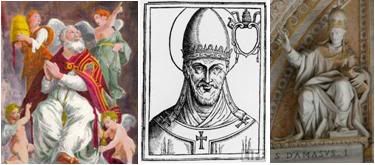 ST. DAMASUS (POPE DAMASUS I, 366-384) (b Lusitania [Portugal] ca 305, d Rome 384)
ST. DAMASUS (POPE DAMASUS I, 366-384) (b Lusitania [Portugal] ca 305, d Rome 384)
The son of a Roman priest, Damasus was described by his secretary St. Jerome as
“an incomparable person, learned in the Scriptures, a virgin doctor of the virgin
Church, who loved chastity and heard its praises with pleasure.” He served Pope
Liberius and was elected to succeed him in 366. But opponents elected an anti-Pope
Ursinus, and violent battles between the two camps followed, that ended only after
Valentinian became emperor and exiled Ursinus. Damasus commissioned Jerome to
translate the entire Bible into what became the first standard version of all 72 books,
the Vulgate. Damasus is also remembered for uncovering the Roman catacombs to pay
proper homage to the early Christian martyrs. He defended Christian orthodoxy
against Arianism and other heresies and was upheld by the Council of Constantinople
in 382. He strengthened the faith after it became the official religion of empire
with his liturgical and esthetic enhancement of the churches of Rome, and defended
the rights of the Papacy in the imperial setting.
Readings for today's Mass:
www.usccb.org/bible/readings/121112.cfm
No events announced today for the Holy Father.
The Office for Papal Liturical Celebrations released the Pope's calendar for the Christmas season,
from the Christmas Eve Mass to the Mass of the Epiphany on Jan 6.
|
| |
 12/12/2012 13:35 12/12/2012 13:35 |
|
| | | OFFLINE | | Post: 25.911
Post: 8.404 | Registrato il: 28/08/2005
Registrato il: 20/01/2009 | Administratore | Utente Master | |
|
 Why Vatican II 'ignored' Communism -
Why Vatican II 'ignored' Communism -
at a time when its godless materialism engulfed
and oppressed more than a billion people
in the Soviet Union, Eastern Europe and China
by Edward Pentin

As the Church celebrates the 50th anniversary of the opening of the Second Vatican Council, there is one lesser-known—and some would argue highly disturbing—aspect of the Council that has tended to be overlooked: the absence of any reference to, or condemnation of, Communism in the Council’s documents, despite the fact that the Soviet Union was at that time at the height of its powers.
[The sheer anomaly of this most blatant omission is perhaps the single greatest flaw of Vatican II, because a deliberate decision was made, for a variety of reasons, not to confront what was then the most frightful existential threat to the world - and to the values of Christianity that had shaped the European countries. It is as though the modern world that Vatican II set out to confront were an a-historical construct that blotted out half of the reality of that time! The omission appears to be not just a contradiction of history, but a moral contradiction, as well, whatever the pragmatic reasons that underlay the decision. Can pragmatism (which, in this case, was straightforward relativism) justify it all?
To provide a simple perspective, in the 1960s, more than a billion people lived under Communist regimes (about 300 million in the Soviet Union and Eastern Europe, and 800 million in China). It is, of course, just as frightening now that China alone (one of a handful of countries still under a Communist regime) now has 1.3 billion people!]
Over the years, many have speculated over the causes of the omission, while others have pondered the consequences, both for today’s Catholic Church and the wider world.
In recent years, the veil of mystery over the omission has gradually been lifted, as historians have uncovered irrefutable evidence explaining how the absence of any reference to Communism in the documents came about.
The omission came as a surprise at the time, as until the Second Vatican Council, the Church had repeatedly spoken out against Communism in its teachings. Its condemnations were clear and unmistakeable, consistent with those of Pope Pius XII, who was unfaltering in his denunciations of Communism until his death in 1958.
In the vota of the Council Fathers — thousands of recommendations gathered from key Church figures just prior to the Council sessions—Communism figured high on the lists of concerns. Indeed for many, it appeared to be the most important area singled out for condemnation.
Historians argue that a number of factors contributed to Communism not being mentioned at all during the Council. The first was the unfortunate timing of the Council. “It was the sixties and a new spirit of optimism hung over the world,” explains Italian Church historian Roberto De Mattei, author of Il Concilio Vaticano II – Una storia mai scritta (Vatican II – An Untold Story). [Optimism??? In October 1962, the world was on the brink of nuclear catastrophe with the Cuban missile crisis (just two months before Vatican II opened, which made its decision to pretend Communism was not a reality even more unconscionable. Andd who but the suddenly militant university students in the West and their psychedelic counterparts were optimistic about anything? Though theirs was perhaps not optimism as much as the inebriating high of suddenly being able to assert themselves and forcing their elders - and the established culture - to cower and concede to them. The optimism of the Vatican II fathers was, on the other hand, genuine and widespread by all accounts, but it was not about 'the world', it was about the Church that they looked forward to renewing (and by the progressives to re-invent all over!)]
“It was during this period that a ‘thawing’ of realities, already defined by the Magisterium as antithetical, ensued.” [What exactly is a 'thawing of realities'? Their dissolution into virtual nothingness, considering that the realities of Communism were simply ignored?]
In particular, Pope John XXIII’s last encyclical, Pacem in Terris, is thought to have played a key role in this change of approach to Communism. For De Mattei, the encyclical “proved decisive,” as it gave the impression of “wanting to overturn the Church’s position against Communism - removing, in fact, every condemnation, even if only verbal.”
The Vatican’s policy of “Ostpolitik” — opening the Church up to the Communist countries of the East through dialogue — is believed to have found its roots in the 1963 encyclical. It was taken up by Msgr. Agostino Casaroli, who, at that time, was effectively the Holy See’s deputy foreign minister, but who would later become Vatican Secretary of State.
But why would John XXIII allow such a break with the hitherto firm line against Communism? Some believe that he had, if not sympathy, then a predisposition to look upon Communism with a degree of ill-founded optimism.
“One commonly held theory, which one can’t prove, is that John XXIII had good relations with [Soviet President] Khrushchev,” says Father Norman Tanner, a Jesuit expert on the Council at Rome’s Pontifical Gregorian University. Certainly, it has been recorded that Khrushchev visited the Pope at the Vatican, and that John XXIII was delighted to receive birthday greetings from the Soviet leader when the Pope turned 80.
In response, John XXIII asked Khrushchev to demonstrate his sincerity for better relations by improving the plight of Catholics—in particular, allowing the imprisoned head of the Ukrainian Uniate church, Archbishop Jozsef Slipyi, to emigrate, a request Khrushchev granted in 1963.
Paul VI also met several times with Soviet officials. These meetings mostly took place after the Council, however, and the efforts were largely in vain: Soviet concessions to the Vatican proved to be mostly meagre in the years that followed.
But another motive stood behind this push towards détente: that of fostering better ecumenical relations with the Russian Orthodox Church. As part of his desire for greater openness of the Church to other Christians and faiths, John XXIII strongly wanted members of the Russian Orthodox Church — then deeply entrenched with the Kremlin and the KGB — to take part in the Council.
The Pope also wanted Catholic bishops from Russia and its satellite states to be allowed to attend the Council sessions. It would be “a kind of quid pro quo,” says Tanner. But to achieve these goals, John XXIII appears to have been prepared to make an extraordinary concession: that the Council refrain from making “hostile declarations” on Russia.
In a 2007 book called The Metz Agreement, veteran French essayist Jean Madiran gathers a number of sourced claims, testifying that a deal was hatched during Soviet-arranged secr
et talks in 1962. The meeting, Madiran says, took place in Metz, France, between Metropolitan Nikodim, the Russian Orthodox Church’s then-“foreign minister,” and Cardinal Eugène Tisserant, a senior French Vatican official. Metropolitan Nikodim was, according to Moscow archives, a KGB agent.
Various sources have since confirmed that an agreement was reached, instructing the Council not to make any direct attack on Communism. The Orthodox then agreed to accept the Vatican’s invitation to send a number of observers to the Council.
Being a secret, verbal agreement, concrete evidence has proven elusive, but De Mattei says he found “a handwritten note” from Paul VI in the Vatican’s Secret Archives confirming the existence of this agreement.
Madiran also backs De Mattei’s claim, saying that in the memo, Paul VI stated he would explicitly mention “the commitments of the Council,” including that of “not talking about Communism (1962).” Madiran stresses that the date in parentheses is significant, as it refers directly to the Metz agreement between Tisserant and Nikodim.
The Vatican would firmly adhere to the agreement during the Council, insisting that Vatican II remain politically neutral. Even a petition of more than 400 Council priests, representing 86 different countries, to include a formal condemnation of Communism in the decrees was rejected.
The petition, presented during the Council’s final session on October 9, 1965, “was not even sent to the Commission working on the document,” De Mattei says, “resulting in a huge scandal.” Surprisingly, even Bishop Karol Wojtyla, who would later become John Paul II but was then a bishop at the Council, was one of those who rejected the petition.
The result is that the constitution Gaudium et Spes, the 16th and final document promulgated by the Council and intended as an entirely new definition of the relationship between the Church and the world, lacked any form of condemnation of Communism. “The Council’s silence on Communism,” says De Mattei, “was indeed an impressive omission of the historical meeting.”
In view of the current consensus among historians of the existence of this secret agreement with the Soviets, perhaps the more interesting question to ask today is: what effect did it have on the Church and the world from that time on? Did the Council nevertheless help bring about the fall of Soviet Communism, or did lack of any condemnation actually prolong the brutal, atheistic ideology?
Some have little doubt that the Second Vatican Council played a key role in ending the Marxist-Leninist experiment. The post-conciliar Church, argue some historians, featured a new emphasis on religious freedom which hastened Communism’s demise, largely thanks to the insistence of Bishop Wojtyla, who helped convince a wavering Paul VI to sign off on the decree Dignitatis Humanae.
And the Council allowed bishops behind the Iron Curtain to meet each other and to talk together outside their countries for the first time.
“It gave them a sense of influence and unity,” says American theologian Michael Novak, who reported on the second session of the Council. He adds that when the bishops returned to their homelands, they would set up churches as meeting places for people of all faiths or none, thanks to the Council’s new spirit of openness and dialogue—something particularly true in Poland.
“A broad alliance was formed of those who loved freedom and wanted to resist the ‘Regime of the Lie,’” Novak explains, adding that Iron Curtain bishops “now had close friends in the West and elsewhere whom they met at the Council.”
Remaining “silent” about Communism and at the same time being open to dialogue was also seen as an avenue worth trying, if, as many thought at the time, Communism would last hundreds of years more (Paul VI did explicitly repudiate Communism in his 1964 encyclical Ecclesiam Suam, although that was not, of course, a conciliar document).
Father Tanner, author of a new book on the Council called Vatican II: The Essential Texts, points out that just as there was no condemnation of Communism, neither was there any formal condemnation of any other evil political ideologies in the Council’s 16 decrees.
“There are no formal condemnations [of these ideologies],” he says. “There were condemnations of war and so on, but not of Nazism and fascism, which were of recent memory at that time.”
But he concedes that these political movements were different from Communism, which was “still very much alive,” and he adds that “many people and bishops in those countries suffered horrendously.”
“They wanted a formal condemnation and urged the Pope to make one,” he said.
This point was eloquently taken up by Cardinal Giacomo Biffi, former archbishop of Bologna. In his 2010 autobiography, Memoirs and Digressions of an Italian Cardinal, the cardinal points out that Communism was “the most imposing, most lasting, most overpowering historical phenomenon of the 20th century” and yet the Council, which contained a decree on the Church in the contemporary world, “doesn’t talk about it.” [And there you have it, stated by the cardinal whom Joseph Ratzinger likely voted for in the 2005 Concalve! to be Pope!]
For the first time in history, he adds, Communism had “virtually imposed atheism on the subjected people, as a sort of official philosophy and a paradoxical ‘state religion,’ and the Council, although it speaks about the case of atheists, does not speak of it.”
Moreover, he stresses that in 1962, Communist prisons were “still all places of unspeakable suffering and humiliation inflicted upon numerous ‘witnesses of the faith’ (bishops, priests, and laypeople who were convinced believers in Christ), and the Council does not speak of it. And some want to talk about the supposed silence towards the criminal aberrations of Nazism, for which even some Catholics (even among those active at the Council) have criticized Pius XII!”
And if the omission, together with Ostpolitik, was aimed at ending Soviet Communism more speedily than other approaches, some historians doubt that was the case. Church leaders remained incarcerated, tortured, and persecuted by Communist regimes after the Council, and Soviet Marxism endured until the fall of the Berlin Wall, nearly 25 years after the meeting’s final session (and of course Communism continues in China, North Korea, and elsewhere).
“If the Second Vatican Council would have condemned Communism, it would have helped accelerate its decline,” says De Mattei. “The opposite occurred. The Vatican’s Ostpolitik prolonged the survival of true socialism in the East bloc countries by 20 years by providing a foothold for Communist regimes in crisis.”
De Mattei adds: “Today we must ask: were those who denounced the brutal oppression of Communism in the Council, calling for its solemn condemnation, prophets? Or were those who believed, as the architects of Ostpolitik, that it was necessary to come to an agreement with Communism — a compromise — because Communism interpreted humanity’s anxieties over justice and would have survived one or two centuries, improving the world?”
Even in the so-called post-Soviet Communist world, some see the omission of any condemnation by Vatican II as having enormous negative consequences on today’s Church and society. Christopher Gillibrand, a respected Catholic commentator in the UK, believes that the lack of a Vatican II condemnation means in modern times “that the Church’s response has been ineffective to the assaults on human dignity by the arbitrary and all-powerful state.”
Others agree that a failure to single-out Communism for the evil ideology that it is has prevented the Church from recognizing socialist thinking within her ranks. “People are concerned about saving the planet, global warming, and there are some certain legitimate concerns here, but we’ve lost an awareness of the salvation of the soul,” says Edmund Mazza, professor of history and political science at Azusa Pacific University in Los Angeles. “That’s Communism, that’s socialism, and that’s what [Antonio] Gramsci [one of the most important Marxist thinkers of the 20th century] wanted.”
In wider society, too, Professor Mazza notes that an increasingly secular society is precisely what the Communists desired.
“The main error of our times is that we’ve lost the transcendent,” he says. “What has happened over the last 50 years? The errors of atheism and socialism, a world without God, has ‘Marxized’ the world so that we’re ready to embrace socialism if it’s couched in the right terms.”
“If you need a job, food stamps, money,” he adds, “then when the government promises to take care of you, you’ll go along with it.”
[Modificato da TERESA BENEDETTA 12/12/2012 14:00] |
| |
 12/12/2012 14:25 12/12/2012 14:25 |
|
| | | OFFLINE | | Post: 25.912
Post: 8.405 | Registrato il: 28/08/2005
Registrato il: 20/01/2009 | Administratore | Utente Master | |
|
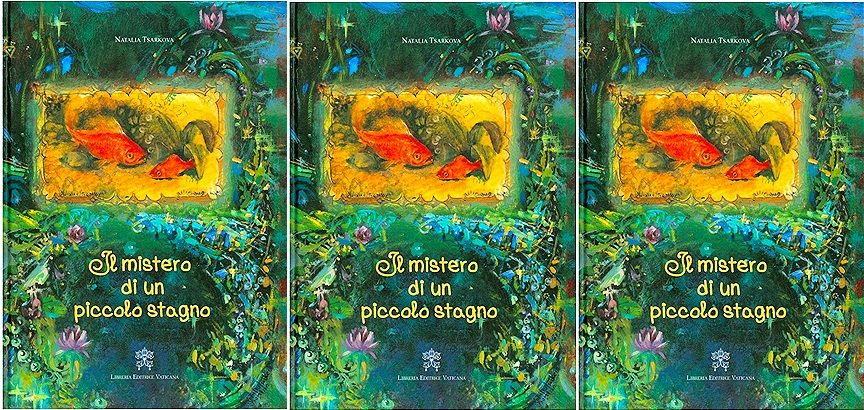 LEV presents children's book on the goldfish
LEV presents children's book on the goldfish
in the papal pond at Castel Gandolfo

VATICAN CITY, December 11 (Translated from TM News) - On Tuesday afternoon, the Vatican publish in house LEV presented a children's book told and illustrated by papal portrait artist Natalia Tsarkova at the Augustinianum not far from St. Peter's Basilica.
The book, Il mistero di un piccolo stagno' (The mystery of a little pond) [which was actually published last October] tells the story of the goldfish in the pond found in the Garden of the Modonnina in Castel Gandolfo - and how they have learned to await the daily visit from 'the man in white' who comes to feed them after he prays before the Madonna statue that gives its name to the garden.
Besides the author-illustrator and Mons. Georg Gaenswein who wrote the Preface to the book, the presentors included Antonio Paolucci, director of the Vatican Museums; Saverio Petrillo, manager of the Pontifical Villas in Castel Gandolfo; and don Giuseppe Costa, director of LEV.
Also present were Mons. Giuseppe Sciacca, secretary of the Vatican Governatorate; Cardinal Raffaele Farina, emeritus Archivist-Librarian of the Holy Roman Church; Angelo Gugel, former valet to both John Paul II and Benedict XVI; and Mons. Paolo de Nicolò, former regent of the Pontifical Household.
Last October, I posted my translation of Mons. Gaenswein's Preface to Tsarkova's book:
The mystery of a little pond
A tale created and illustrated
by Natalia Tsarkova, painter
Foreword by Mons. Georg Gaenswein
Translated from the 10/10/12 issue of

It is not a secret that Benedict XVI loves the Vatican Gardens, but he especially loves the Gardens of the Pontifical Villas in Castel Gandolfo.
Whenever he is in residence at the 'Castello' during the summer months, he takes a walk through the gardens every day, praying the Rosary amidst the beauty of creation: the trees, the plants, the flowers, the birds, the farm animals, the great orchard, the olives, the centuries-old oaks, the majestic cedars and so many other beauties of nature are an invitation to enjoy and meditate on creation.
They are like a symphony of extraordinary forms and colors, of amazing sounds which do good for the heart and soul. All nature, all creation, is a tangible testimonial to the greatness and beauty of the Creator, who made it all for us.
Among the places most loved by the Holy Father at the Castello is the Giardino della Madonnina, which was made for his predecessor Pius XI in 1933, and since him, four more Pontiffs before Benedict XVI would find it a pleasant place to pray - Pius XII, John XXIII, Paul VI and John Paul II.

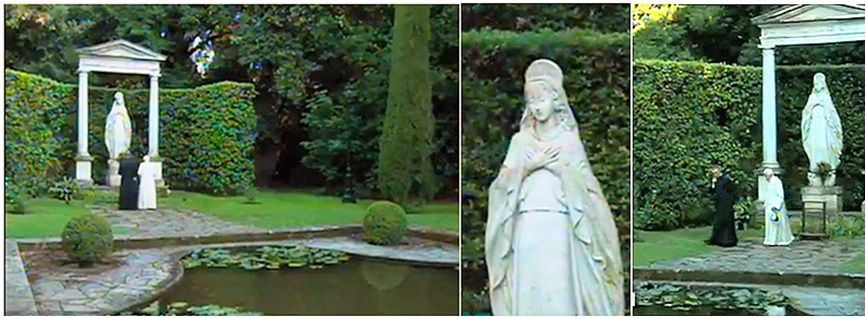
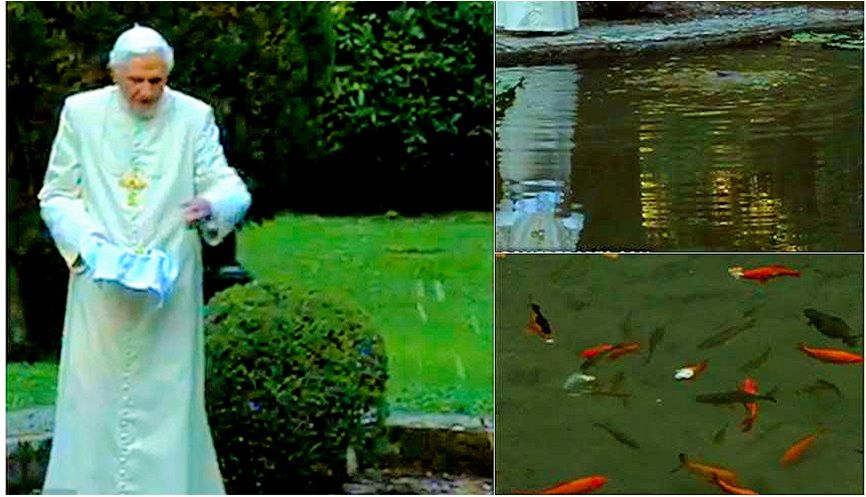
Before the image of the Virgin Mary in the garden named for her, there is a little pond with red fish and two large carp. Every time the Pope finishes his prayers before the Madonnina, the fish seem to gather at the edge of the pond, awaiting a generous treat from the Holy Father.
In fact, an anonymous and generous hand daily prepares a small bag with bread crumbs for the Pope to feed the fish. There is great 'joy' and lively activity in the pond when the 'largesse' comes.
This is the routine that gave birth to the story told by the author of this engaging little book, The mystery of the little pond
, which is the story of two goldfish.
Natalia Tsarkova composed a dialog between Father Goldfish and his son, and has enhanced her story with marvelous illustrations and designs. And in the end, she could not do without a cat...
Behind the story is, of course, the Pope's love of creation, of animals, especially the small ones. Thus, to look at all creatures, including the small ones - who often escape an inattentive look - with the eyes of love, is the message of this engaging book.
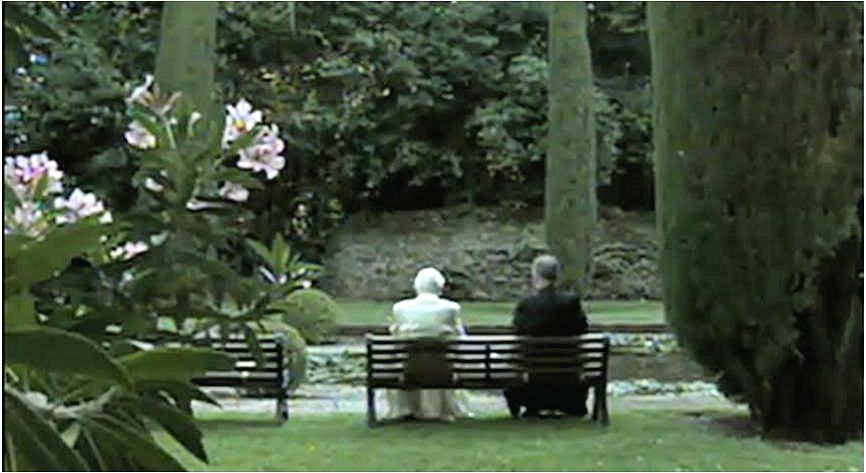
[Modificato da TERESA BENEDETTA 12/12/2012 16:20] |
| |
 12/12/2012 14:27 12/12/2012 14:27 |
|
| | | OFFLINE | | Post: 25.913
Post: 8.406 | Registrato il: 28/08/2005
Registrato il: 20/01/2009 | Administratore | Utente Master | |
|

 Wednesday, December 12, Third Week of Advent
Wednesday, December 12, Third Week of Advent
FEAST OF NUESTRA SENORA DE GUADALUPE
'Queen of Mexico', Patroness of the Americas
 Images from left: Apparition to Juan Diego; the miraculous image on the tilma; etching of Juan and the cloak; 18th-cent painting "God painting the image of Guadalupe'; battle standard of General Miguel de Hidalgo in the Mexican War for Independence; and Juan Diego's tilma with the image, venerated in the Basilica of Guadalupe.
December 12 commemorates the day when the image now venerated as Our Lady of Guadalupe appeared miraculously on the cloak of the man who is now St. Juan Diego, remembered by the Church on December 9, the date of the Lady's first apparition to him on Tepeyac hill (part of what is now Mexico City), bidding him to tell the bishop to build a church in her honor. The skeptical bishop asked for a sign, and Juan Diego returned to Tepeyac to intercede for a sick uncle and convey the bishop's reaction. The Virgin told him his uncle would recover and asked him to gather roses on the hilltop to bring to the bishop. Juan wrapped the miraculous roses in his cloak and when he opened it for the bishop, the cloak itself was found to carry the image of the Lady who had appeared to him. The initial surge of popular devotion and conversions to Catholicism inspired by the miracles, coinciding with the early years of the Protestant Reformation in Europe, grew to be the most popular devotion in all Latin America and perhaps the world. Millions of faithful visit the Shrine of Guadalupe on the two days of spiritual celebrations Dec. 11-12 dedicated to Our Lady. This shrine has become the most visited Marian shrine in the world.
Images from left: Apparition to Juan Diego; the miraculous image on the tilma; etching of Juan and the cloak; 18th-cent painting "God painting the image of Guadalupe'; battle standard of General Miguel de Hidalgo in the Mexican War for Independence; and Juan Diego's tilma with the image, venerated in the Basilica of Guadalupe.
December 12 commemorates the day when the image now venerated as Our Lady of Guadalupe appeared miraculously on the cloak of the man who is now St. Juan Diego, remembered by the Church on December 9, the date of the Lady's first apparition to him on Tepeyac hill (part of what is now Mexico City), bidding him to tell the bishop to build a church in her honor. The skeptical bishop asked for a sign, and Juan Diego returned to Tepeyac to intercede for a sick uncle and convey the bishop's reaction. The Virgin told him his uncle would recover and asked him to gather roses on the hilltop to bring to the bishop. Juan wrapped the miraculous roses in his cloak and when he opened it for the bishop, the cloak itself was found to carry the image of the Lady who had appeared to him. The initial surge of popular devotion and conversions to Catholicism inspired by the miracles, coinciding with the early years of the Protestant Reformation in Europe, grew to be the most popular devotion in all Latin America and perhaps the world. Millions of faithful visit the Shrine of Guadalupe on the two days of spiritual celebrations Dec. 11-12 dedicated to Our Lady. This shrine has become the most visited Marian shrine in the world.
Readings for today's Mass:
www.usccb.org/bible/readings/121212.cfm
AT THE VATICAN TODAY
General Audience - The Holy Father says God is in our midst but the world is too distracted to notice.
This was also the occasion at which he sent the first Papal tweet (shortly followed by other tweets
responding to questions at #askpontifex).
 One year ago...
One year ago...
The Holy Father presided at a concelebration of the Eucharist at St. Peter's Basilica for the peoples of
Latin America on the Feast of Our Lady of Guadalupe and on the occasion of the bicentenary of the declarations
of independence by the Latin American nations between 1804-1824.
[Modificato da TERESA BENEDETTA 13/12/2012 16:53] |
| |
 12/12/2012 14:51 12/12/2012 14:51 |
|
| | | OFFLINE | | Post: 25.914
Post: 8.407 | Registrato il: 28/08/2005
Registrato il: 20/01/2009 | Administratore | Utente Master | |
|
 The tweet awaited
The tweet awaited
around the world

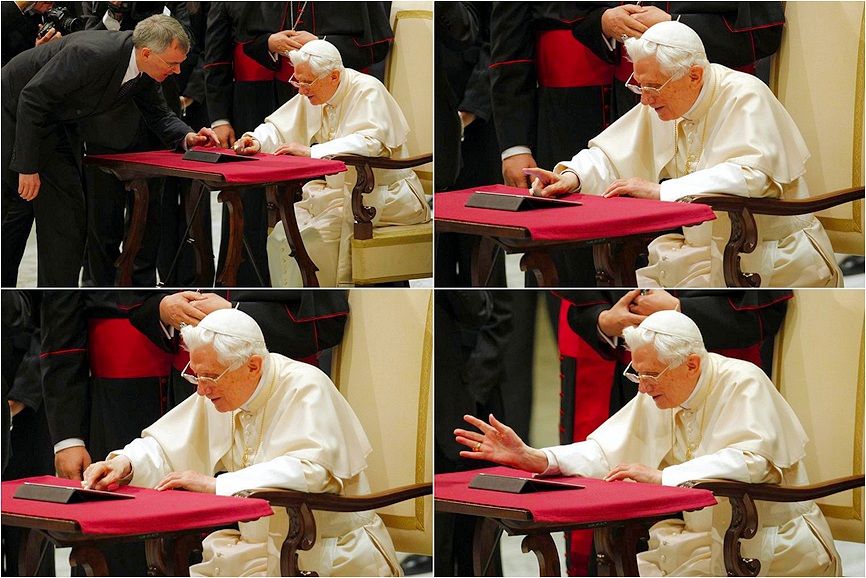
VATICAN CITY, December 12 (AP) — The Pope has tweeted.
In perhaps the most drawn out Twitter launch ever, Pope Benedict XVI pushed the button on a tablet brought to him at the end of his general audience Wednesday. It read: “Dear friends, I am pleased to get in touch with you through Twitter. Thank you for your generous response. I bless all of you from my heart.”
Later in the day he was to respond to a few messages sent to him from around the world. As the countdown to his first tweet from his Twitter handle @Pontifex neared, the pope had garnered nearly 1 million followers in the eight languages of his account.

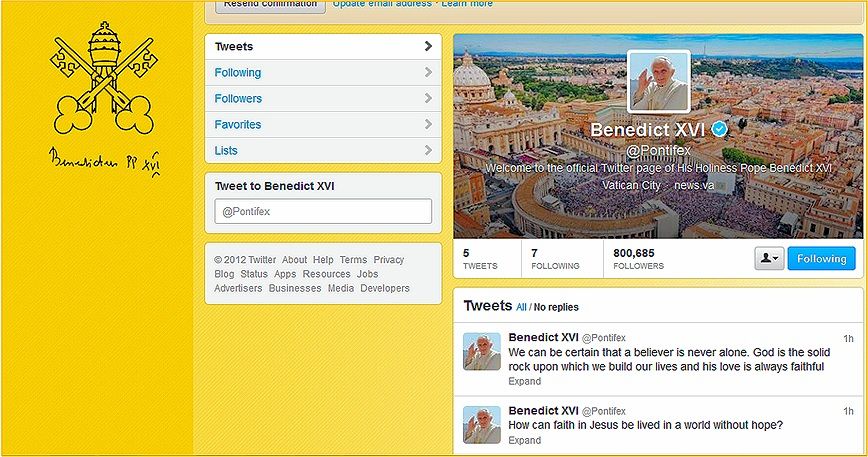 The opening message and answers to the first two questions...
The Vatican, at the end of the bulletin on today's GA, reports thus:
The opening message and answers to the first two questions...
The Vatican, at the end of the bulletin on today's GA, reports thus:
At the end of the General Audience, right after the papal blessing, the Holy Father sent out his first tweet on a tablet:
Dear friends, I am pleased to get in touch with you through Twitter. Thank you for your generous response. I bless all of you from my heart.
Benedict XVI @Pontifex
Besides English and Italian, the Pope's tweet appears in Spanish, Portuguese, German, Polish, Arab and French under the following accounts: @Pontifex_es; @Pontifex_pt; @Pontifex_de; @Pontifex_pl; @Pontifex_ar; @Pontifex_fr.
The Pope was assisted at his first tweet by Thaddeus Jones, of the Pontifical Council for Social Communications and Claire Díaz-Ortiz of Twitter.
Also present were two students of Villanova University, Mika Rabb and Andfew Jadick, who are currently working with the Pontifical Council for Social Communications, and the Mexican journalist Katia Lopez-Hodoyan.
Today, the Pope was to respond to three questions chosen from those who sent questions to #askpontifex.
It was easier to get this out of the way first before posting on the GA-proper... It's appalling that much of the reporting on this has focused on numbers
and silly questions like will the Pope get more followers than Lady Gaga or Justin Bieber...
God bless this entire enterprise....
[Modificato da TERESA BENEDETTA 12/12/2012 16:36] |
| |
 12/12/2012 17:28 12/12/2012 17:28 |
|
| | | OFFLINE | | Post: 25.915
Post: 8.408 | Registrato il: 28/08/2005
Registrato il: 20/01/2009 | Administratore | Utente Master | |
|
 Fr. Schall introduces relative illiterates like me to a term that surely applies to the consuming passion with which Benedict XVI - and all the great thinkers of the Church before him - has pursued the truth in the Truth embodied by Christ.
On 'philosophical eros'
Fr. Schall introduces relative illiterates like me to a term that surely applies to the consuming passion with which Benedict XVI - and all the great thinkers of the Church before him - has pursued the truth in the Truth embodied by Christ.
On 'philosophical eros'
By James V. Schall, S. J.

December 11, 2012
Editor’s Note: Fr. Schall delivered “A Final Gladness,” his last lecture at Georgetown University Friday evening in Gaston Hall, which was packed with former and current students, the papal nuncio, and various other luminaries. Moren on this later... Though our dear friend will be retiring to a Jesuit community in Los Gatos, California, in March, we expect him to continue his always noteworthy contributions to this page – of which the present column is a sterling example – for a long time to come. – Robert Royal
In book seven of the Republic, Socrates asks: “What then, Glaucon, would be a study to draw the soul from becoming to being?” (521d).
This is a question we do not ask ourselves every day, though perhaps it should be. The question asks about a “study” that might incite us to consider things of highest importance. We do not automatically make this step by ourselves. Many of us need to be awakened, even prodded. We need to be “turned around,” as Socrates tells us. Yet we all have in us the capacity to know. Indeed, more than anything else, this capacity defines us. We are the beings who by nature seek to know, know what is, whatever it is.
Later in this same book, we read: “For souls, you know, are far more likely to be cowardly in severe [difficult] studies than in gymnastics. The labor is closer to home in that it is the soul’s privately, and not shared in common with the body” (535b). That is, though both are important, sports are easier to comprehend than metaphysics. Yet sports too can wake us up to notice the existence of things worthy for themselves.
When we read this passage about cowardly souls, we remember that this same Glaucon was called “brave” by Socrates in the second book because he insisted on asking Socrates about the truth even when he could make persuasive arguments against its possibility.
The military virtue, bravery, came to be applied to philosophical inquiry, to the insistence on knowing the truth, nothing less. No doubt few things are more needed today than our courage to ask about the truth of the reigning moral aberrations now increasingly established as law and custom by our regime and with the consent of most of us. In a world where relativism is king, truth finds itself the martyr. Where truth cannot be spoken, no one can reform his life.
How is this issue understood? Our courts and university faculties are no longer courageous enough to ask whether what they were deciding and teaching is true. In order to avoid responding to this basic question – “Is it true?’ – with an answer not merely an opinion, they have preferred to go on and on making distinctions and equivocations that would allow them to continue to undermine our moral and intellectual stature so that they could justify certain ways of acting and living.
The term “philosophical eros” comes from the followers of Leo Strauss. It refers to Socrates, of course. At first sight, to juxtapose “eros” and philosophy is just as odd as to juxtapose courage and philosophic inquiry. We assume that “eros” and philosophy oppose each other. Plato himself implied this in the famous fifth book of the Republic. “Eros,” as it were, is a bodily word; philosophy is a heady one. Yet the phrase “philosophical eros” intrigues us. Ideas will not let us alone.
The term “philosophical eros” means, roughly, that we should pursue the truth with the same passion and zeal that we pursue our beloved. Indeed, it implies, at least in Christianity, that we can, if we will, pursue the truth even if we give up the normal consummation of eros in marriage. But philosophical eros and marriage are not in conflict either, except perhaps in St. Paul’s sense that the married man has many concerns.
We live in a time when any notion that truth exists or that it should be pursued is identified with fanaticism. The skeptic will fanatically pursue his own skepticism, while those who pursue the truth he will call “fanatics.”
And while the principle of contradiction remains the fundamental philosophical tool, we find that it means little to those who do not mind giving their souls to contradiction in order that they do not have to acknowledge error and change their ways.
Augustine, in a famous passage, told us that two loves built two cities. He meant that it is quite possible to pursue falsity and evil, claiming it to be good, with every bit as much passion as the saints pursue the truth.
“Eros,” as such, in other words, what is simply bodily, is not itself the last criterion of truth. The martyr is indeed a witness who suffers for his cause, but if he is not a witness to truth, he is doubly dangerous.
The world, we can say, is in some sense built on ideas. If the ideas are wrong, the structure of the human world will be wrong.
We do not like to admit that our “subjective” ideas have “consequences.” We like to think, with the Supreme Court, that we can construct our own vision of reality that has no need to inquire whether it is true or not.
In such a world, we cannot even talk to one another nor have any issue between us resolved by persuasion.
Philosophical eros does not let us rest with such illusory opinions in our souls.
James V. Schall, S.J., who served as a professor at Georgetown University for thirty-five years, is one of the most prolific Catholic writers in America. His most recent books are The Mind That Is Catholic and The Modern Age.
Born in 1928, Fr. Schall is a year younger than Benedict XVI. Thankfully, like him, he continues to be spiritually and intellectually productive, even in retirement (an occasion denied to our Holy Father). But what a blessing it is to live in the age of Internet that effaces time and space barriers and ensures we can always 'hear' and learn almost instantaneously from the great thinkers of our time!
[Modificato da TERESA BENEDETTA 12/12/2012 17:30] |
| |
 12/12/2012 18:28 12/12/2012 18:28 |
|
| | | OFFLINE | | Post: 25.916
Post: 8.408 | Registrato il: 28/08/2005
Registrato il: 20/01/2009 | Administratore | Utente Master | |
|

 Seeking God in a distracted world
Adapted from
Seeking God in a distracted world
Adapted from

December 12, 2012
Benedict XVI sent out his first-ever Message via Twitter under his personal Twitter handle: @pontifex, at the end of today's General Audience.
It was a gesture the Pope indirectly referred to in his catechesis earlier, saying "God has not gone away from the world, he is not absent, but comes to meet our needs in various ways which we must learn to discern”.
He pointed out that among the areas in which we can discern signs of God's presence in the world are also the new instruments that technology makes available for communicating, especially among the young.
In English, he said:
Continuing our catechesis for this Year of Faith, we now consider the unfolding of God’s self-revelation and his saving plan. The Scriptures show us its development in the history of Israel, especially in the events of the Exodus and the establishment of the Covenant.
Down the centuries Israel cherished and celebrated the memory of these saving events and, through the prophets, learned to look forward to a new and eternal Covenant destined for all mankind. The one divine plan, realized gradually in human history, culminated in the coming of Jesus Christ, the incarnate Son of God.
In this Advent season, we are invited to contemplate this progressive revelation of God’s saving plan and to realize that, in Christ, God continues to drawn near to us. Amid the distractions and superficiality of our world, may we learn, in faith, hope and love, to recognize and bear witness to his presence, radiating in our lives the light and joy which filled the stable of Bethlehem.
Here is a translation of the full catechesis:
Dear brothers and sisters,
In the last catechesis, I spoke of the Revelation of God, as a communication that he makes of his own self and of his benevolent plan of love for us. This Revelation of God takes place in time and in the history of man: a story that "becomes the arena where we see what God does for humanity. God comes to us in the things we know best and can verify most easily, the things of our everyday life, apart from which we cannot understand ourselves" (John Paul II, Enc. Fides et ratio, 12).
The evangelist St. Mark - as we just heard - reports in clear and synthesizing terms, the initial moments of Jesus's preaching: “This is the time of fulfillment. The kingdom of God is at hand" (Mk 1,15).
That which illuminates and gives full meaning to the history of the world and of man began to shine in that cave in Bethlehem.It is the mystery that we will soon contemplate at Christmas - the salvation which is realized in Jesus Christ.
In Jesus of Nazareth, God showed his face and asks man to decide whether to acknowledge him and follow him. God revealing himself in history to enter into a relationship of dialog with man gives a new meaning to the entire human journey.
History is not just a simple succession of centuries, years, days, but it is the time of a presence which gives full meaning to that journey and opens it up to solid hope.
Where can we read the stages of this Revelation by God? Sacred Scripture is the privileged place for discovering the events of this journey, and I wish - once more - to invite everyone, in this Year of Faith, to take up the Bible more often in order to read it and meditate on what it says; to pay more attention to the readings in Sunday Mass - all this constitute a precious nourishment for our faith.
Reading the Old Testament, we can see how the interventions of od in the history of the chosen people, he with whom the tight alliances made do not simply pass off and fall into oblivion, but they become 'memory', together constituting the 'history of salvation' that had been kept alive in the consciousness of the people of Israel through their celebration of the salvific events.
Thus, in the book of Exodus, the Lord tells Moses to celebrate the great moment of liberation from slavery in Egypt - the Jewish Passover - with these words: "This day will be a day of remembrance for you, which your future generations will celebrate with pilgrimage to the LORD; you will celebrate it as a statute forever" (12,14).
For the entire people of Israel, remembering what God had wrought has become a sort of constant imperative for the passing of time to be marked by the living memory of past events which therefore, from day to day, shape history anew and remain present.
In the book of Deuteronomy, Moses addresses his people and says: "Be on your guard and be very careful not to forget the things your own eyes have seen, nor let them slip from your heart as long as you live, but make them known to your children and to your children’s children" (4,9).
Thus he also tells us: 'Watch out that you do not forget the things that God has done for us'. Faith is nourished by discovering and remembering that God is always faithful, that he guides history, and that he constitutes the sure and stable foundation upon which our lives can rest upon.
The canticle of the Magnificat, which the Virgin Mary raised to God, is a supreme example in the history of salvation, of the memory that keeps God's action alive.
Mary exalts God's merciful action in the concrete journey taken by his people, the faithfulness to the promises of alliance made to Abraham and his descendants - all this are living memories of the divine presence that never diminishes (cfr Lk 1,46-55).
For Israel, the Exodus was the central historic event in which God revealed his potent action. God freed the Israelites from slavery in Egypt so that they may return to the Promised Land and adore him as the only true Lord.
Israel did not undertake the journey to be a people like others - to have a national independence - but to serve God in worship and in living, to crate for God a place where man is obedient to him, where God is present and adored in the world. And naturally, not just for themselves, but to bear witness to him in the midst of other peoples.
The celebration of this event is to make it actual and present because God's work never diminishes. He keeps faith with his plan of liberation and continues to pursue it so that man may acknowledge and serve his Lord and respond with faith and love to his action.
God therefore reveals himself not only in the primordial act of creation, but by entering into our history, the story of a small people wo were neither the most numerous nor the strongest in their time.
This Revelation of God, which continues in history, culminates in Jesus Christ: God, the Logos, the creative Word which is at the origin of the world, incarnated himself in Jesus to show the true face of God.
In Jesus every promise is fulfilled, in him culminates the story of God with mankind. When we read the account of the two disciples walking towards Emmaus, told to us by St. Luke, we see how clearly it emerges that the person of Christ illumines the Old Testament - the entire history of salvation and demonstrates the grand unitary design of the two Testaments, it shows the way they are united.
Indeed, Jesus explains to the two wayfarers who were disoriented and disappointed [after the crucifixion and death of Jesus] that he was the fulfillment of every promise:T"hen beginning with Moses and all the prophets, he interpreted to them what referred to him in all the scriptures" (24,27).
The evangelist reports the exclamation of the two disciples after having recognized that their travelling companion was the Lord: “Were not our hearts burning [within us] while he spoke to us on the way and opened the scriptures to us?” (v 32).
The Catechism of the Catholic Church summarizes the stages of divine Revelation and synthesizes its development (cfr Nos. 54-64);from the beginning, God invited man to intimate communion with him and even when man, through his disobedience, had lost his friendship, God did not abandon him to the power of death but offered his alliance to man so many times (cfr Messale Romano, Euch. Prayer IV).
The Catechism goes over God's journey with man, from the alliance with Noah after the flood, to his call to Abraham to leave his native land to be father to a multitude of peoples. God formed Israel as his people through the event of the Exodus, the alliance on Sinai, and the gift, through Moses, of the Laws, so he might be acknowledged and served as the one true and living God.
With the prophets, God leads his people into hope for salvation. We know, through Isaiah, about the 'second Exodus', the return from exile in Babylon back to their own land and the re-foundation of the people of Israel. At the same time, however, many remained in dispersion, and thus began the universality of this faith.
In the end, they were no longer expecting just a king, David, a son of David, but a 'Son of man' who would be the salvation of all peoples. There were encounters between cultures, first with Babylon and Syria, then later even with the Greek multitudes. We see then how the way of God widens, how it was opening ever more towards the mystery of Christ, King of the universe. In Christ, Revelation is finally realized in its fullness: He himself became one of us.
I have dwelt on recalling the action of God in human history to show the stages of this grand design of love attested to in the Old and New Testaments: a unique plan of salvation addressed to all mankind, progressively revealed and realized by the power of God, in which God always reacts to the responses of man and finds new beginnings for alliance when man loses himself. This is fundamental in the journey of faith.
We are in the liturgical season of Advent which prepares us for the Holy Nativity.As we all know, the term 'advent' means 'coming, 'presence' - and in the old days, it referred to the arrival of the king or emperor to a given province.
For us Christians the word indicates a marvelous and shattering reality: God himself left his heaven and came down to man. He created a covenant with him by entering into the history of a people. He is the King who has descended to this poor province which is earth and has made a gift to us of his visit by taking on our flesh, becoming a man like us.
Advent invites us to retrace the journey of this presence, and always reminds us anew that God has not removed himself from the world, he is not absent, he has not abandoned us to ourselves, but comes to meet us in various ways that we must learn to discern.
Likewise, we are called upon every day - with our faith, our hope and our charity - to discern and bear witness to this presence in the world that is often superficial and distracted, and to make that light that illuminated the cave in Bethlehem shine forth again in our life. Thank you.
[Modificato da TERESA BENEDETTA 13/12/2012 15:55] |
| |
 13/12/2012 16:15 13/12/2012 16:15 |
|
| | | OFFLINE | | Post: 25.917
Post: 8.410 | Registrato il: 28/08/2005
Registrato il: 20/01/2009 | Administratore | Utente Master | |
|
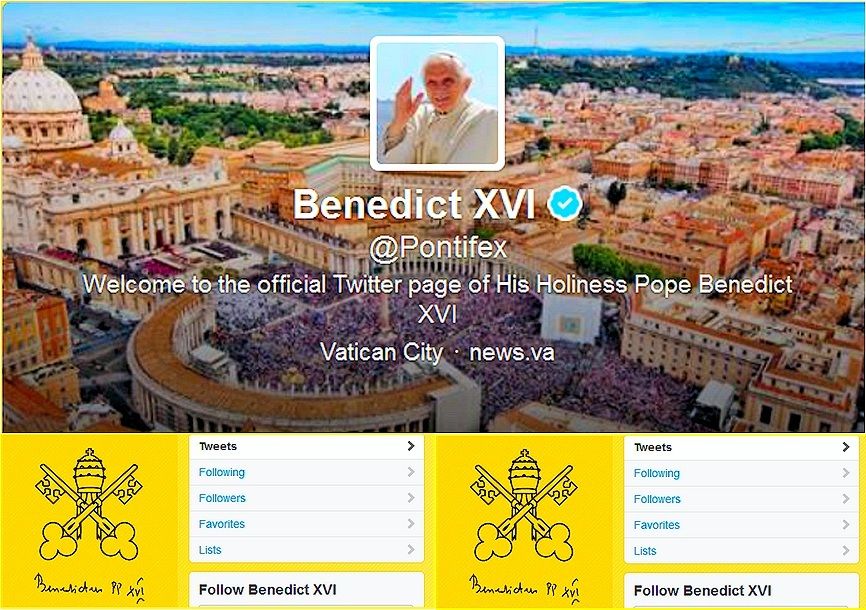 For the history books:
For the history books:
The first day of Papal tweets
12/12/12
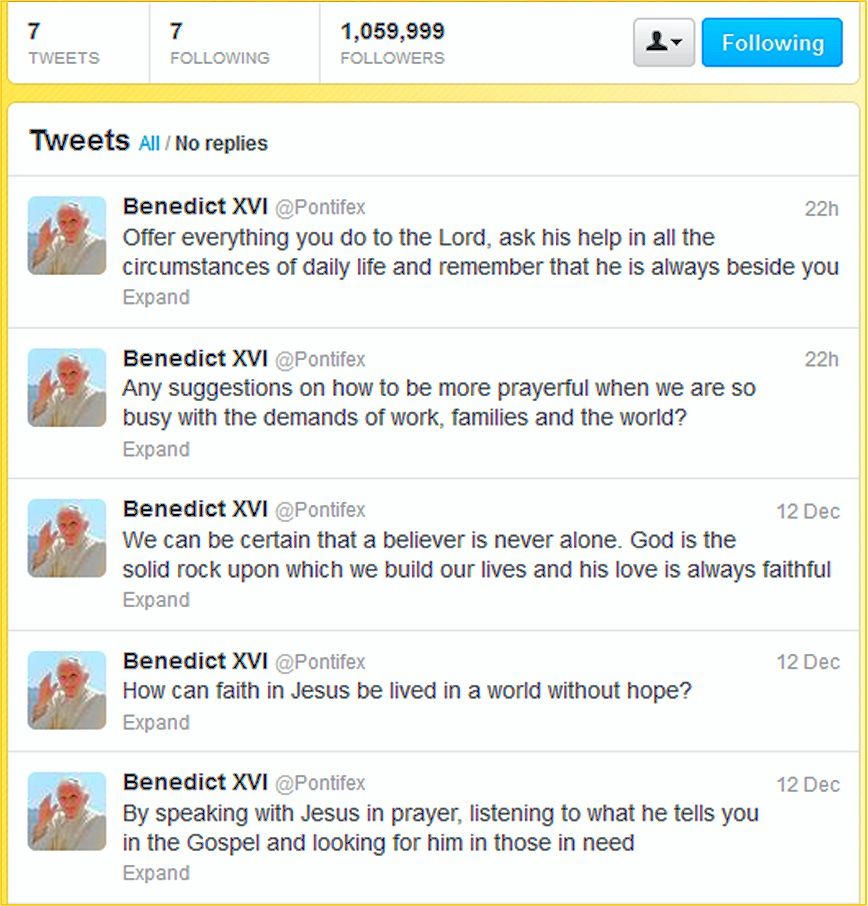 |
| |
 13/12/2012 16:55 13/12/2012 16:55 |
|
| | | OFFLINE | | Post: 25.918
Post: 8.411 | Registrato il: 28/08/2005
Registrato il: 20/01/2009 | Administratore | Utente Master | |
|


 Thursday, December 13, Second Week of Advent
Thursday, December 13, Second Week of Advent
MEMORIAL OF ST. LUCY
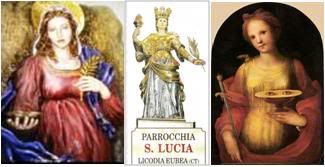 ST. LUCIA (Sicily, 283-304), Virgin and Martyr
ST. LUCIA (Sicily, 283-304), Virgin and Martyr
Born to a wealthy family, Lucia is said to have vowed herself to virginity,
refused to marry a man chosen by her family, and gave away her dowry
to the poor. For her staunch defense of her faith in Christ against the
prevailing society of her day, she was executed during the Diocletian
persecution. Legend has it that her eyes were gouged out before she was
put to death, an event commemorated in her images and her veneration
as the patroness of eyesight. Although little historical fact is known about
her, she is venerated as a saint by all the Christian churches, and is one
of only seven women (including Mary) mentioned in the Canon of the Mass.
Lutherans in the Scandinavian countries have a particular devotion to her.
Unusually for a saint, she is also immortalized in the famous Neapolitan
folk song 'Santa Lucia'.
Readings for today's Mass:
www.usccb.org/bible/readings/121312.cfm
AT THE VATICAN TODAY
The Holy Father met with
- New ambassadors from Guinea, St. Vincent and Grenadines, Niger, Zambia, Thailand, and Sri Lanka.
who presented their credentials. Address in French.
- H.E. Madame Anne Leahy, Ambassador from Canada, on her farewell visit.
- Prof. Carl A. Anderson, Supreme Commander of the Knights of Columbus.
- Mons. Gerhard Ludwig Müller, Prefect of the Congregation for the Doctrine of the Faith.
|
| |
|
|
|
|